#florentine street
Explore tagged Tumblr posts
Text

Florentine Street Scene with Twelve Figures (Sheltering the Traveler, One of the Seven Works of Mercy)
Artist: Anonymous
Date: 1540-1560, Florence
Medium: Oil on Panel
Collection: Rijksmuseum, Amsterdam, Netherlands
Description
Florentine street scene with twelve figures. Cityscape with travelers standing at a crossroads of two streets, probably in Florence. Formerly interpreted as the sheltering of travelers, one of the seven works of mercy.
#painting#oil on panel#florentine street#figures#traveler#16th century art#cityscape#florence#city#italy#european art
18 notes
·
View notes
Text

Graffiti. Florentin, Tel Aviv . January 2024.
95 notes
·
View notes
Text

Street scene in Saint-Florentin, Burgundy region of France
French vintage postcard, mailed in 1915
#france#tarjeta#postkaart#sepia#saint-florentin#saint#carte postale#ansichtskarte#burgundy#scene#mailed#briefkaart#region#photo#photography#postal#postkarte#1915#vintage#florentin#french#postcard#historic#street#ephemera
3 notes
·
View notes
Text
instead of you [part five] || l.mh


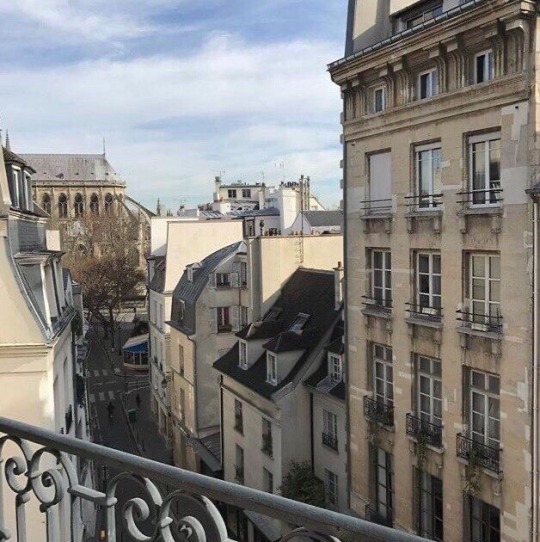
pairing: [best friend’s brother] lee minho x college!reader ft. han jisung
summary: you didn’t expect to spend your summer pretending to be your best friend’s girlfriend- then again, you didn’t expect to fall for your best friend’s brother, either.
warnings: swearing, mentions of sex (18+ mdni)
word count: 3.4k
a/n: revamped my tom holland series from my main blog ( @wazzupmrstark ) to try and motivate myself to finish it!! ; i know minho is the chef of the group but just suspend your disbelief for this series and pretend it's jisung
series masterlist | early access to the next chapter on ko-fi
“This would be a lot easier if any of us spoke French,” Felix grumbled, lugging his suitcase awkwardly down the cobblestone street.
“I took a couple of classes in high school,” you offered.
“Can you read this map?” Jisung’s dad asked, handing you the comically large sheet of paper.
The only reason they weren’t using their phones’ GPS was that the international data plan wouldn’t be activated until the next day, leaving the six of you to fend for yourselves without technology until midnight. It had been a small oversight, but it had left you wandering around the streets of Paris for over half an hour already.
You held the map in front of your face and examined it closely, trying to decipher where you were in relation to the buildings and landmarks on the page. You knew the hotel was on the corner of Place de la Concorde, but you weren’t sure where you were.
“I know ‘rue’ means street,” you said nervously.
All of the Hans were looking at you expectantly. You felt like the responsibility of getting everyone to where they needed to be was on your shoulders now, and the pressure was making you sweat.
“Do you know what ‘rue’ we’re on?” Felix asked impatiently.
“Do you see a street sign?” you countered, trying not to come across as frustrated as you felt.
“We’re on Rue Saint-Honore,” Jisung said gently. “And the intersection of this street and Rue Saint-Florentin is a few meters in front of us.”
“Oh, then our hotel is just a few blocks up the street! We were just one street up from the one we needed to be on.”
You handed the map back to Jisung’s dad who tucked it into the pocket of his backpack and smiled.
“Perfect, you lead the way, y/n.”
-
“Your dad and I will be in this room, 313. Minho and Felix, you’ll be right next door to us. And Jisung and y/n will be on the end in room 317,” Nikki explained as she distributed the keys to each pair.
“You know why they put us in between them and Jisung,” Felix muttered to Minho under his breath as he made an obscene gesture with his hands. Minho chuckled quietly and nudged Felix’s shoulder with his own, earning identical glares from you and Jisung.
“Yeah, we’re the buffer,” Minho agreed, subtly sizing you up from beneath his gaze.
“Behave.” Nikki warned her sons
“No promises.”
“Listen to your mother, boys,” Dom, their father, piped up from behind his wife.
And that was it. They departed down the hallway towards their own room and left the four of you standing in the hallway by yourselves.
“Well, we’ll let you two… settle in,” Felix said pointedly with a raise of his eyebrow.
“I hate you,” Jisung grumbled.
“What are older brothers for?”
“We’re twins. And I was born first.”
Felix just shrugged. “Like I said.”
Jisung turned away from them to face you. The boys’ voices faded into the background as they retreated down the hallway to their own hotel room.
“Sorry about them.”
You smiled reassuringly. “You’ve been gone for too long. They have to make up for lost time.”
“Yeah, but I wish they wouldn’t make gross jokes in front of you.”
“That’s sweet, but have you forgotten that I used to make those same jokes about you and your exes?”
“I wish I could,” he groaned.
“Some of my best comedic work.”
“That’s not saying much.”
You ignored the jab and took the room key from his hands.
“I know they don’t mean any harm,” you reasoned. “One day, when you meet someone for real, the three of us will never give you a break about it.”
Jisung blinked. “Can’t wait.”
“Me either,” you hummed in agreement.
You turned and led the way to your room with Jisung trailing on your heels. The door unlocked on the first try and the two of you stumbled into the room together, immediately dropping all of your belongings onto the carpeted floor.
You gasped at the sight before you, barely registering the click of the door behind you.
The room was gorgeous, but you were focused on the view outside. The curtains on all of the windows were drawn and the windows themselves were ajar so that the natural light and fresh air could filter in. You had seen dozens of movies that took place in Paris, but none of them captured the true beauty of the city. Haussmanian buildings stretched as far as the eye could see and the tip of the Eiffel Tower peeked out behind the gray roofs in the distance. The entire city looked like it had been wrapped in tea-stained parchment paper, balanced on the line between film set and history. You could hear the bustle of traffic and vendors from the streets below, reminding you that this was not some sort of dream and that you were actually there.
Behind you Jisung was setting your suitcases on luggage racks against the wall, having already had his fill of the view apparently.
You threw yourself onto the bed and sighed loudly, shifting your attention onto your best friend who was organizing the contents of his backpack.
“What’s the plan?” you asked
“You didn’t read the itinerary, did you?”
“I skimmed.” He shook his head in exasperation. “You can’t expect me to have memorized everything on there!”
“No, but I thought you would at least read today’s schedule!”
“You didn’t read it either, did you?”
You both stared at each other momentarily before Jisung broke out into a grin and you threw a pillow at his head.
“I knew it!”
“We’re a mess, aren’t we?”
“I’ll look at the schedule,” you offered. “I still have the email.”
You rolled over to reach for your backpack and fished your phone from the front pocket. Jisung waited in silence while you scrolled through your inbox and read over the itinerary.
“We’re free until tomorrow morning,” you said.
Jisung’s shoulders sagged in relief and he plopped his body down onto the bed next to you.
“Thank god.” He gave you a defeated look. “It hasn’t even been a whole day and I’m already exhausted of my family.”
You liked spending time with the Hans, but you understood Jisung’s sentiment. They weren’t your family, and so you didn’t have to use much social energy or patience with them. But family vacations were familiar events to you. And there was only so much family time a person could take.
“I know the feeling.”
“I’m glad I have you with me,” Jisung admitted. “I love them, but I couldn’t spend two months alone with them.”
“Is that why you picked a school abroad?” you asked, realizing you had never really talked about it with him before.
“Kind of.” He rolled onto his side to face you. “Felt like it was the only way I could become my own person.”
“What do you mean?”
“Just that, without being dramatic, it’s a little hard to escape my family’s influence- especially where we live.”
You were still lost, but your eyes were beginning to feel heavy so you just nodded.
“Have you ever felt like that?” he asked, voice starting to sound distant.
“I think so…”
It felt like you had just blinked when you opened your eyes again, but the room had turned dark. You couldn’t tell what time it was, but the moon was hanging low in the sky, casting light onto the water beneath it. Jisung was still beside you and he had fallen asleep as well. The sound of his gentle breathing filled the silence. You both had dozed off on top of the bed without any blankets which had caused you to roll yourself into a ball in your sleep. You stretched out, groaning at the stiffness in your muscles, and reached over to the nightstand to check your phone.
It was well past dinnertime by now, but you knew that you and Jisung needed to eat something. You shook his shoulder gently to wake him.
“Hm?”
“It’s after nine, Ji,” you whispered. “Are you hungry?”
He nodded. “Is anything open?”
“I’m sure we’ll find something. Do you want to ask your brothers if they want to go with us?”
Another nod.
-
Fifteen minutes later, you and all three of the Han boys were downstairs standing on the street just outside the lobby. No one in your group knew Paris well enough to know where they were going so Jisung just pointed in a direction and shrugged.
“Did you fall asleep too?” Minho asked as you walked along the sidewalk next to the Seine together.
Felix and Jisung were a few strides ahead, leading the way in front of you. You could faintly hear them bickering about directions, but were trying to tune them out as best you could.
“Almost immediately.”
“Me too.”
“I wanted to get out and see some of the city today, but my body had other plans I guess.”
“You’ll see plenty of the city tomorrow,” Minho assured you. “And the next day and the next. Trust me, you’ll be sick of this place by the time we leave.”
“How can anyone get tired of Paris?”
“Once you get over the art and the scenery, you remember all of the colonization and it becomes a lot less special.”
“Well when you put it that way,” you mumbled under your breath, ignoring the way Minho laughed at you.
“It’s still a cool city. France is just…”
“The worst.”
“Yeah, pretty much.”
“How many times have you been?” you asked.
“To Paris, or France in general?”
“Either.”
“A few.” He said it casually, but you had a feeling he might have been lowballing it.
You were about to ask him another question when the two of you were interrupted by a man in a black vest with a stack of menus in his hands.
“Madame, vous et votre petit ami- voudrais-vous manger ici?”
“Oh, he’s not my boyfriend,” you said instinctively, “uh, but I guess that doesn’t matter. Do you guys want to eat here?”
It was the only restaurant open on the whole block and everyone was hungry so it was an easy decision. You let the man pull you inside with Minho on your heels and Jisung and Felix trailing not too far behind.
Once all four of you were seated he distributed a handful of English-printed menus before returning to his post outside where he could drag more wandering tourists into the café.
“Do you want something to drink?” Jisung asked you, flipping the menu over.
“What do they have?”
“Here,” he said and leaned over to show you. “They have a lot of wines, a few domestic beers, oh they have a tequila sunrise-”
Across the table, Minho raised an eyebrow and smirked at you. You averted your gaze immediately, cheeks burning.
“We can share one,” you suggested meekly.
“Sounds good. What are you guys getting?”
“Beer,” Felix and Minho replied simultaneously.
Jisung shook his head. “Predictable.”
“What about food?” Felix continued, unphased by his brother’s remark. “All I’m seeing is fondue.”
“It’s a fondue place,” Minho pointed out and turned the menu around to show Felix the title.
“Thanks, mate, couldn’t have figured it out without you.”
“What does y/n want? She’s the guest.” The three boys turned and looked at you expectantly. “No pressure,” Minho added.
“Um,” you paused and glanced over to your fake boyfriend. “JIsung knows what I like. And I’m sure he knows what you both like. He can choose.”
You mouthed a sorry to your best friend, but he brushed it off with a smile and nodded.
“I can do that.”
The food came out almost immediately after it was ordered, as nearly everything was meant to be prepared by the diners, and the drinks followed shortly after. Jisung had ordered a white wine and swiss fondue for the table along with a red wine broth to cook the meat and potatoes in.
The restaurant was relatively empty. Your party and one other were the only people in the entire place, aside from the servers and the bartender. The man who had pulled you inside was still working the sidewalks underneath the red and white striped awning hanging over the door, but the night was visibly winding down for everyone in the neighborhood.
Vendors had started folding their sandwich boards and latching their shutters. Every time you looked across the street a couple more lights in windows had gone out. Inside, servers began folding tablecloths and stacking chairs on top of each other, all while encouraging you to take your time eating. But as soon as Felix noticed the first table being cleared all four of you started shoving food into your mouths as fast as possible. It didn’t matter that everything was being doused in scalding hot liquid, you would just have to deal with the first-degree burns later. The time pressure had also caused everyone to attempt to “flash cook” their food- which just meant turning up the intensity on the Sterno and cooking everything for half the recommended time. tom
“We’re not going to get food poisoning, right?” Felix asked as he cut into a piece of what could be classified as maximum rare steak.
Jisung shrugged. “Probably not.”
“What do you mean ‘probably not’?”
“How am I supposed to know?”
“You’re the one with a degree in culinary arts!”
“I don’t have a degree yet,” he clarified, correcting his twin.
“Okay, but you’re studying culinary arts.”
“Yeah, and there’s a reason you’re supposed to cook meat for a specified amount of time so let’s just not think about it.”
Felix pursed his lips, but didn’t say anything else.
“How’s your sunrise?” Minho asked with a grin. He had stopped eating just to ask you that question. You were half-tempted to stomp on his foot.
“Good, why?” Jisung answered for you.
“No reason. Just curious.”
Minho paid the bill without a second thought. He pretended not to hear you when you offered to pick up the tab while Felix and Jisung gave you dirty looks. They even yelled at you when you tried paying for yourself. God forbid you ever tried to get any of them a Christmas present. There was no winning with these boys.
Jisung held your hand on the walk back to the hotel. His entire body was warm from the alcohol, but his hands were especially warm because they always were. It was one of the little things that made him your favorite person. Whenever you were cold you could just grab one of his hands. Even if you weren’t particularly chilly, the warmth still was still comforting and familiar. Felix wasn’t wrong when he said you and Jisung were always all over each other. You were always holding hands, which is probably part of the reason so many people thought you were dating.
Your thumb circled the small scar on the back of his hand absentmindedly as you strolled along the river. He’d had it since before you met, but you knew the story. Something about learning how stoves get hot the hard way.
The walk took a little longer than it should have because you had aimlessly wandered around to find dinner and didn’t keep track of your route, but you picked up on familiar landmarks eventually and used your best judgment to lead the way. You said your goodnights to the boys in the elevator and parted ways in the hallway.
“I hope you’re ready for tomorrow,” Minho said as he held his keycard up to the sensor on the door next to yours. It sounded more like a warning than anything else.
You turned back to Jisung. “It won’t be that bad, right?”
He shrugged noncommittally and squeezed your hand. “It’ll be fine.”
-
“How do I look?” you asked and turned away from the mirror to face Jisung.
It was the next day, and the sun had barely risen, but everyone was scheduled to be downstairs at 7:00 for the days’ activities. Today was the first day that you were required to wear a matching shirt with the rest of the Hans and while you hadn’t been excited about it, it wasn’t so bad now that you were actually wearing it.
Jisung’s mom had designed shirts for each leg of the trip, which had taken up a considerable amount of room in your luggage but saved you the hassle of having to pick out an outfit every day. Today’s shirt was a bright red, Nikki’s favorite color, and it had a picture of the Eiffel Tower on the front. On the back, it said ‘HVC’ which apparently stood for Han Family Vacation. The shirt was a little big on you so you had tucked it into your jeans so that it wasn’t completely swallowing your figure.
Along with your t-shirt and jeans, you were also wearing… Nikes. The tennis shoes and jeans combo really completed the tourist aesthetic, but you were taking comfort in the fact that everyone else would be wearing the same thing too. You’d tied a red bandana into your hair to keep it out of your face which made you look kind of like a Girl Scout, but you already looked like an elementary schooler with your ensemble so you figured you might as well keep it.
“I feel like this is a trick question,” Jisung admitted.
“Wrong answer.”
He sighed and ran a hand through his hair. “We’re all wearing the same thing, y/n, we’re all going to look stupid.”
“Yeah, but I still want to look cute!”
“You always look cute.”
You gave him a look. “You know what I mean. I’m supposed to look girly and feminine and put together!”
“Says who?”
“I just… assumed you would want me to,” you said with a shrug. “I thought you’d want me to be, you know, cutesy and- for your parents?”
“When have I ever been into those kinds of girls?”
You rolled your eyes. “Oh right, I forgot you have a ‘not like other girls’ complex.”
“You know what I meant. I just want you to be yourself.”
“I don’t think you mean that.”
“Well, the PG version of yourself.”
“Okay, I can do that.”
“You’re already acting like you’re in love with me, I don’t think your talents extend past that.”
“Ouch.”
“I’m just saying, our entire act would fall apart. You’re barely believable as it is now-”
“What part of ouch did you not understand?”
“Sorry.”
You blew out a breath and put your hands on your hips. “Should we go downstairs?”
“Yeah, let’s go.”
Nikki and Dom were already in the lobby when you and Jisung got down there and Minho and Felix followed shortly after. Everyone looked blindingly bright with their matching shirts on and you were already getting looks from other guests.
Dom announced that everyone would get breakfast somewhere close by on the way to the sights so that you’d save time. No one was in much of a mood to talk since it was so early, so you just followed Jisung’s family quietly as they made their way out of the hotel together.
The sun was peeking out from behind the skyline now, casting a soft glow onto the cobblestone streets. The park across from where you were staying was already bustling with the day’s activity. Nearly all of the benches were occupied by people enjoying pastries or coffee. Picnickers were speckled throughout the grassy areas on blankets they had brought from home, some reading books, some playing fetch with their puppies. Others were busy walking their dogs or going for their morning runs.
Observing everyday life in the places you visited was one of your favorite things about traveling. Inserting yourself into the rhythms and routines of each city, watching small interactions between strangers, something about it made you feel at home even though you were an outsider.
The feeling crept up on you as you watched a jogger stop to pet a dog, calling it by name and bending down to scratch it behind the ears. Jisung had resorted to pulling you by the hand each time you got distracted, tugging whenever you paused for a second too long so that you wouldn’t lose his family walking ahead of you.
You thought he must be getting annoyed with how many times he had to remind you to keep moving, but every time he pulled you caught him smiling at you out of the corner of your eye. He’d shake his head in exasperation or make a point of sighing loudly but kept whatever he was thinking to himself. It was weird not to be sharing every little thing you were thinking with each other, but you had the feeling that you’d have to get used to that from now on.
iou tags: @sluttywoozi @gimmeurtmi @phobia0325 @fwess @hipsdofafangirl @galaxleeknow @urmomma0324 @bangmechanpls @102598s @farfromsugafanfic @ritzy-roo @dimpledsatan @bvselines @wonderfulshinee @imwithurmother @smollquokka @rosexjimin @skizzel @endzii23 @lady-lena @kwanisms @ch4nniebang @lilramennoodle @babyphotos0325 @kpflyn @dearalice @sojohns @mistlitmoonlight @yoontaethings @babebatter @mal-lunar-28 @shy-kisu @zerefdragn33l @downbadreading @sana-within-you @saquso @bunnispaces @reianagarcia @hyunehans @imtoooyoungforthisshit @i8rsie @honeslykindahorny @214racha @hgema @chillllllli @vixensss @smhlino @feiyaa @borahae-reads @bigbearenergy @hoodiesandicedcoffee @darkacademic2512 @y00nzin0
add yourself to the taglist here!!
#instead of you skz#iou skz#stray kids x reader#skz x reader#stray kids x female!reader#stray kids x fem!reader#skz x female!reader#skz x fem!reader#stray kids x bi!reader#lee know x reader#lino x reader#lee know x female!reader#stray kids series#skz series#lee know series#lee know fanfic#stray kids fanfic
345 notes
·
View notes
Text

Mary I's Fight For The Throne
1st October - Mary is crowned England's first Queen Regnant
On the 31st September, the day prior to her coronation, Mary had processed through London "sitting in a chariot of tissue, drawn with 6 horses, all betrapped with red velvet". 1 The Earl of Oxford bore the sword before her and Sir Edward Hastings led her horses. After the queen's chariot came another covered in cloth of silver "and therin sat at the end, with her face forward, the lady Elizabeth; and at the other end, with her back forward, the lady Anne of Cleves." 2
There were a variety of different pageants across the city, including one by the Florentines where "an angel clothed in green with a trumpet in his hand [...] was made with such a device that when the trumpeter who stood secretly in the pageant did blow his trumpet, the angel did put his trumpet to his mouth as though it should be that he blew the same." 3 Arches in the display included an image "of the Queen triumphant [and under] was written Salus Publica [Public Welfare]. Under the image of Pallas (Athena) Invicta virtus [Invicible Virtue]. Under the history of Tomyris, Libertatis ultrici [Avenging of Liberty]. Under Judith, Patriæ liberatici [Liberator of the Country]. 4
Another one involved "children clothed in women's apparel, the middle having a crown on her head and a sceptre in her hand called Grace, the other on her right called Virtue with a cup and the third Nature with an olive branch. When the queen passed they knelt down and sang." 5
Many featured children and singing; children from the schoolhouse in Saint Paul's church sung verses to Mary, and "there she stayed a good while and gave diligent ear to their song." 6 Another had children holding burning lit tapers "made of most swete perfumes." 7
The star of the show was an acrobat on Saint Paul's steeple, that stood on the weather vane and shook a little flag with his hand, and "after standing on one foot did shake his other leg, and then kneeled on his knees upon the said weather cock, to the great marvel and wondering of all the people which beheld him, because it was thought a matter impossible." 8
The next day, 1st October, Mary's Coronation officially takes place. The streets are "again covered with flowers and decked with stuffs." 9 as Mary goes "from the Hall of Parliament and Justice to the church, in procession with the bishops and priests in full canonical dress." 10
In the church, "the Quire [was] very richly hung with cloth of arras [and] well strewed with rushes, and the place between the high altar and the chair." 11
Once she had entered, "She mounted a scaffolding that was erected at the church for this purpose, and showed herself to the people." 12 The scaffolding had "stairs up to the same and down to the altar, and thereupon a throne of seven stairs, whereof the four uppermost covered with fine baudekin, and the other stairs covered with carpet. And in the middle of the throne set a great royal chair, covered with baudekin damask gold, with two cushions; one black velvet embroidered with gold very richly, and the others of cloth of tissue; the said chair having pillars at the back, whereon stood two lions of gold, and in the midst a turret with a fleur de lys of gold." 13
The Bishop of Winchester conducts Mary to the four corners of the dais and cries "If any man will or can allege any cause why queen Mary should not be crowned, let them speak now :" and then the people in every place of the church cried, " Queen Mary!" 14 He then proclaims the queen's pardon, and Mary is "brought unto the said throne again, and immediately removed into a rich chair by the gentleman ushers before the high altar, upon which altar her Grace offered her pall of baudekin [and money], verifying the words of Scripture,' Thou shalt not appear void before the Lord God." 15
She then returns back to her chair, where a cushion of velvet is then "laid before the altar, upon the which her Grace lay prostrate while certain oraisons were said over her." 16
After oath is taken and the Litany chanted, Mary prepares to be anointed. She had requested fresh oils from Rome to be anointed with, as she had "a scruple that the holy chrisms prepared in England may not be such as they ought because of the ecclesiastical censures upon the country." 17
Now she has "a pall holden over her by four knights of the Garter, the Bishop of Winchester applying the holy oil and chrism and saying unto her certain words, with divers oraisons and prayers. Then after the inunction the Bishop of Winchester did dry every place of the same with cotton or linen cloth." 18
Mary is then brought to the alter again, where she offers up a sword, before returning to her throne at the high alter where "the Bishop of Winchester and the Duke of Norfolk brought unto her Highness three crowns; to wit, one King Edward [the Confessor]'s crown; the other the imperial crown of the realm of England; the third, a very rich crown purposely made for her Grace. Then the crowns were set one after another upon the Queen's head by the Bishop of Winchester; and betwixt the putting on of every crown the trumpets did blow." 19

After the crowning, the choir sing Te Deum accompanied by organs. While the singing occurs, "a ring of gold was put on her Grace's marrying finger by the Bishop of Winchester." 20
Mary is then given bracelets of gold and precious stones by the Master of her Jewel House, before being delivered the royal sceptre, Saint Edward's Staff, the royal spurs, the ball of gold, and the regal of gold by various nobles. 21
"And the Queen thus sitting in her chair apparelled in her royal robes of crimson velvet, containing a mantle with a train, a surcoat with a kirtle furred with the wombs of miniver, pure, a riband of Venice gold, a mantle lace of silk and gold, with buttons and tassels of the same, having her crown imperial on her head, her sceptre in her right hand, and the ball in her left hand, was conveyed again to the throne to St. Edward's chair; having a pair of sabatons on her feet, covered with crimson cloth of gold, lined with crimson satin, garnished with a ribbon of Venice gold." 22
The nobles gathered then pay homage to her, while the Lord Chancellor declares "a goodly large and ample pardon for all manner of offences except certain persons and conditions [...] not worthy to be pardoned." 23
After, Mass is sung while the Gospel is brought to Mary, who kisses it. At the offering part of the Mass ceremony she makes an offering of bead, wine and a pound of gold, and after is conducted to the alter where the Bishop "took the crown from her head and set it on the said altar. Then she was conveyed again into her traverse, and the Lord Great Chamberlain received of her all the regalia, and delivered them to the Dean of Westminster, to be laid upon the said altar. Then her Grace was unclad of her apparel, and other royal apparel given to her by the said Great Chamberlain, a robe of purple velvet with the kirtle and surcoat overcoat, and a mantle with a train furred with miniver and powdered ermine, and a mantle lace of silk and gold, with buttons and tassels of the same, and riband of Venice gold, the crown set upon her head, and a goodly canopy borne over her by the barons of the cinque ports." 24
By this time it is almost 4pm, and Mary has "in her hand a sceptre of gold, and in her other hand a ball of gold, which she twirled and turned in her hand as she came homeward" 25 out of the church.
Mary is carried from the church to Westminster Hall, where a banquet is prepared. After she leaves the church, there is a "scramble for the cloth and rails." 26
At the banquet Mary sits "on a stone chair covered with brocade, which they say was carried off from Scotland in sign of a victory, and was once used by the Kings of Scotland at their crowning", 27 and is served by earls, lords, knights and officers.
The Bishop of Winchester sits on Mary's right, while on her left is her sister Elizabeth and former stepmother, Anne of Cleves. 28
After the first course, "there came riding in on two goodly coursers the Lord High Steward of England, and the Earl Marshal, both richly apparelled, and their horses trapped according to their estate". 29 After the second, "the Queen's Champion appeared upon a courser richly trapped with cloth of gold, holding in his hand a mace, and on the other side of him a page, one holding his spear, another his target with a herald before him. The usual challenge having been made, and repeated thrice, the champion received the cup as his fee from which her Majesty had drunk to him." 30
While the "earls, vassals, and councillors paid homage to her, kissing her on the shoulder", 31 "The Queen's style was then proclaimed by Garter with the rest of the officers of arms, in Latin, French, and English, concluding with ' largesse, largesse, largesse.'" 32
This leads to poor people swarming the kitchens for the left over meat, "And when they had done casting out meat there was no less scrambling for the kitchen it self, every man that would plucking down the hordes thereof, and carrying it away, that it might well be called a waste indeed." 33
After, Mary stands with Elizabeth and Anne of Cleves while the Mayor of London brings another "goodly standing cup of gold to the Queen's Majesty, and after her Highness had drunk so, gave the Mayor the cup." 34
Mary finally withdraws to her private Parliament chambers, and after changing back into her original clothes, is conveyed by water back to Westminster palace, where there is yet more "feasting and cheer." 35
As a relived Simon Renard writes after the event, "the ceremonies came to an end without any of the interruptions or troubles that were feared on the part of the Lutherans, who would rejoice in upsetting the Queen's reign." 36
At the age of 37, Mary has finally achieve her birth right and is the first crowned Queen of England.
Sources:
1. Wriothesley's Chronicle
2. Wriothesley's Chronicle
3. Wriothesley's Chronicle
4. Giulio Raviglio Rosso’s Historia, somegreymatter.com
5. Wriothesley's Chronicle
6. Wriothesley's Chronicle
7. Wriothesley's Chronicle
8. Wriothesley's Chronicle
9. Spanish State Papers, 3rd October 1553
10. Spanish State Papers, 3rd October 1553
11. Crowns & Coronations: A History of Regalia
12. Spanish State Papers, 3rd October 1553
13. Crowns & Coronations: A History of Regalia
14. Wriothesley's Chronicle
15. Wriothesley's Chronicle
16. Wriothesley's Chronicle
17. Spanish State Papers, 9th September 1553
18. Wriothesley's Chronicle
19. Wriothesley's Chronicle
20. Wriothesley's Chronicle
21. Wriothesley's Chronicle
22. Wriothesley's Chronicle
23. Wriothesley's Chronicle
24. Crowns & Coronations: A History of Regalia
25. Wriothesley's Chronicle
26. Chronicle of Queen Jane and Queen Mary
27. Spanish State Papers, 3rd October 1553
28. Crowns & Coronations: A History of Regalia
29. Crowns & Coronations: A History of Regalia
30. Crowns & Coronations: A History of Regalia
31. Spanish State Papers, 3rd October 1553
32. Crowns & Coronations: A History of Regalia
33. Chronicle of Queen Jane and Queen Mary
34. Crowns & Coronations: A History of Regalia
35. Crowns & Coronations: A History of Regalia
36. Spanish State Papers, 3rd October 1553
6 notes
·
View notes
Text
Victor Hugo on Talleyrand's death
For @empirearchives who was interested, here's a translation of Victor Hugo's text about Talleyrand's death. My thanks to @microcosme11 for her help <33
Choses Vues, Victor Hugo
1838
Talleyrand
19th of May
In the Rue St-Florentin, there is a palace and a sewer.
The palace, with its noble, rich, and dull architecture, was long called "Hôtel de l'Infuntado"; today, we read on its front door: Hôtel Talleyrand. During the fourty years he lived on this street, the last host of this palace might never have set eyes on this sewer.
He was a stranged, feared, and considerable character: his name was Charles-Maurice de Périgord; he was noble as Machiavel, a priest like Gondi, defrocked like Fouché, witty as Voltaire, and lame as the devil. One could say that everything limped with him: the nobility which he had put to the service of the republic, the priesthood he had dragged on the Champ-de-Mars then threw down the drain, the marriage he had broken by twenty scandals and by a voluntary separation, the wit he dishonoured through vileness. This man, nevertheless, had grandeur.
The splendours of both regimes were mixed together inside of him: he was prince of the old kingdom of France, and prince of the French Empire.
For thirty years, from the depth of his palace, from the depth of his mind, he had just about led Europe. He had let the revolution call him "tu", and had smiled at it, ironically of course; but it had not noticed. He had approached, known, observed, pierced, stirred, upturned, delved into, mocked, intellectually fertilized all the men of his era, all the ideas of his century, and there had been a few minutes in his life when, holding in his hand the four or five fearsome threads that moved the civilized universe, he had had for a puppet Napoleon the First, Emperor of the French, King of Italy, Protector of the Confederation of the Rhine, Mediator of the Swiss Confederation. Such was the game this man played.
After the Revolution of July, that old race, whose grand chambellan he was, having fallen, he found himself standing on one foot and told the people of 1830, sitting, bare-armed, on a pile of cobbles: Make me your ambassador.
He had received Mirabeau's last confession and Thiers' first confidence. He had said himself he was a great poet and had made a trilogy in three dynasties: Act I, Buonaparte's Empire; Act 2, The House of Bourbon; Act 3, The House of Orleans.
He had done all of this in his palace, and, in this palace, like a spider in its web, he had attracted into it and taken successively heroes, thinkers, great men, conquerors, kings, princes, emperors, Bonaparte, Sieyès, Mme de Staël, Chateaubriand, Benjamin Constant, Alexander of Russia, Wilhelm of Prussia, Francis of Austria, Louis XVIII, Louis-Philippe, all the golden, shiny flies who buzzed in the history of those last fourty years. The whole sparkling swarm, fascinated by this man's deep eye, had successively passed under the dark door that bore, written on its architrave: Hôtel Talleyrand.
Well, the day before yesterday, 17 March, 1838, that man died. Doctors came and embalmed the corpse. For this, like the Egyptians, they first withdrew the bowels from the belly and the brain from the skull. Once done, after they had transformed the prince de Talleyrand into a mummy, and nailed this mummy in a white satin-lined coffin, they withdrew, leaving upon a table the brain, that brain which thought so many things, inspired so many men, built so many edifices, led two revolutions, fooled twenty kings, contained the world.
Once the doctors were gone, a valet entered, he saw what they had left. Hold on! they forgot this. What to do ? He remembered that there was a sewer in the street, he went there, and threw that brain into this sewer.
Finis rerum.
74 notes
·
View notes
Text
Loser Bracket Round 1, Match 1
Lebkuchen (Little Goody Two Shoes) vs Sister Maria-Fiore dei Fiori di Montagna (The 44 Scotland Street Series)


Sister Maria-Fiore is a member of the Little Sisters of the Bourgeoisie
Lebkuchen
She is Elise's (the protagonist) childhood friend and one of the game's three romanceable options. Lebkuchen is the town's local nun, renowned for her generosity and intuition. Every night as Elise heads home, she passes by Lebkuchen on her swing, making sure she's well-fed by giving her some of her homemade bread, always trusting her regardless of her brash attitude and odd behavior during the main story. However, Lebkuchen canonically says she's not a saint, and on the first date you can have with her she shouts about how the Father is a “bald geezer” who “belongs in a pigpen” from the church balcony. She also enjoys engaging in gossip, and constantly teases Elise, who describes her as more like an imp. Their dynamic is as sweet as sugar, and Lebkuchen is a very lovable rebel in her own right who deserves to last a few rounds in the tournament :]
Sister Maria-Fiore dei Fiori di Montagna
Italian socialite nun from a religious order dedicated to tending to people afflicted with "Stendhal Syndrome" (falling ill due to being overcome by the beauty of Florentine art at the Ufizzi Museum). They brew their own gin, grow lemons and make tonic water, which they combine to make their cure for Stendhal Syndrome. She is also in a thinly veiled lesbian relationship with her "friend" Antonia, who she met when Antonia came down with Stendhal Syndrome.
#best nun tournament#poll#poll tournament#Loser Bracket#Loser Bracket Round 1#lebkuchen#little goody two shoes#lgts#pocket mirror#astralshift#Sister Maria-Fiore#44 Scotland Street#Love in the Time of Bertie
6 notes
·
View notes
Text
Lido di Camaiore (Lucca), August 18, 2023 - The growing anticipation for Louis Tomlinson's concert in Lido di Camaiore is evident from two facts: first, as soon as you arrive at Benelli Village, the area that contains the Bussoladomani Arena, you can hear the pervasive music of rehearsals in the air. Second, hundreds of fans, the vast majority of them girls, are gathered on a stretch of cycle path that runs along what was once a plot of the Benelli family farm. The family once owned much of the real estate and gave its name to the neighborhood.
The first fans arrived on August 7: four Spanish girls between the ages of 18 and 23 who had camped in front of the Bussoladomani gate to be the first to enter. For several days, one turned a blind eye since camping on the public street— complete with sleeping bags and Canadian tents— would not be regular, but after all, there were only four polite and civilized girls, who did not leave dirt on the ground or cause any chaos. Then, from four, they became ten, and now they are at least two hundred, despite the fact that the concert is not until Saturday night. These fans were waiting many days to attend the Away From Home Festival for just a few hours, which after the first two editions in London and Malaga, landed at the Lido. The star of the evening will be Tomlinson, who judging by the good “fanaticism” of his supporters seems to have won the derby with former benchmate Harry Styles, whose fans in July had camped at the Campovolo in Reggio Emilia for “only” a week prior. Jokes aside, if Styles is now a world celebrity on the front line, it must be said that all the former One Direction members have had a good path after the breakup of the band, and now Tomlinson is a very successful soloist.
Returning to the fans, even the Mayor Marcello Pierucci went to visit them, satisfied to see so much enthusiasm and movement in an area that has experienced decades of abandonment and degradation despite being one of the touristic pearls of Tuscany. Some of the residents and holidaymakers— here most of the houses are second homes of Florentines, Prato, Pistoia, Pitoiesi, Lombards and so on— seem all in all willing to accept the temporary discomfort, between noise, traffic, parking bans and a day— that of Saturday— that has led some to temporarily leave their holidays and return home until Sunday,
The fans have been moved from what will in fact be the red zone of the concert area, and brought a few tens of meters further east, towards Via Trieste, where they camped with tents, umbrellas and sleeping bags in an enclosure built on the cycle path, under the pine trees to have shade, with chemical baths available. A few more hours, and then they will finally be able to reach the concert pit: all this effort, in fact, is aimed at only one goal, to attend the concert from the front row. Have a good show.
32 notes
·
View notes
Text

Florentine Street Scene with Twelve Figures
Artist: Anonymous
Date: 1540 – 1560
0 notes
Text

Doorway. Florentin, Tel Aviv.
#yzshot#travel#israel#doorway#architecture#portal#antique#patina#tel aviv#florentin#street#street photography#city#urban
14 notes
·
View notes
Text

Street scene in Saint-Florentin, Burgundy region of France
French vintage postcard
#france#tarjeta#postkaart#sepia#saint-florentin#saint#carte postale#ansichtskarte#burgundy#scene#briefkaart#region#photo#photography#postal#postkarte#vintage#florentin#french#postcard#historic#street#ephemera
5 notes
·
View notes
Text
By: Adam Zivo
Published: Jun 6, 2024
At a trendy cafe in the bohemian Florentin district of Tel Aviv, Niv Nissim, a 30-year-old gay Israeli, described the Oct. 7 attack by Hamas as “maybe the worst moment for everyone who lives in Israel.” He spoke of an acquaintance who perished at the Nova Festival massacre. “He went to dance and he was murdered. Most of the people that got murdered and kidnapped are people with the same values that I have — peace advocates,” Nissim said.
He was shocked to see international queer activists glorify Hamas in the immediate aftermath of the Oct. 7 massacre. “They don’t know what Hamas is. They think Hamas is like a group of superheroes — and that’s the thing. It’s a terror organization. Same as al-Qaida,” Nissim said. “For gay people around the world to be pro-Hamas right now is crazy. And it’s wrong.”
After Hamas massacred more than 1,100 Israeli civilians, LGBTQ activists across the western world mobilized. On city streets and university campuses, they called for the destruction of Israel and carried “Queers for Palestine” banners alongside rainbow Palestinian flags. Claiming that queer and Palestinian advocacy are inextricably linked, they minimized the brutality of Hamas, who they portrayed as freedom fighters.
What are we going to do now? What can we do? How could we fight for human rights (in Gaza) after what happened?
-- Niv Nissim, talking about October 7
Their behaviour ignited a global debate about western queer activism. Commentators noted that not only does Hamas murder gay people, Israel is the only country in the Middle East that supports queer rights. Was it not delusional for activists to side with Hamas?
And what exactly did people mean when they shouted, “Queers for Palestine”? For some, the slogan represented a principled commitment to the human rights of the Palestinian people, without supporting Hamas. But for others, it meant the dismantling of the Israeli state, which implies the ethnic cleansing of millions of Jews, and the glorification Hamas’s war crimes.
Throughout this debate, the everyday lives of LGBTQ Israelis and Palestinians — their fears, trauma and triumphs — were largely ignored. In May, I visited Tel Aviv through a trip spon.sored by the non-profit Exigent Foundation, a Jewish group that focuses on public education. Arriving a few days early, I independently spoke with queer people in the city to find out what their lives were really like, what they thought of the war and how they felt about western activists’ views on the conflict.
I interviewed four gay Israeli men, each with distinct experiences and perspectives. They were by no means a comprehensive cross-section of Israel’s LGBTQ community, but they opened a window into their world. Amid tight timelines, I was unable to secure interviews with gay Palestinians, who can be notoriously difficult to track down because they fear revealing themselves, so as an imperfect substitute, I asked my Israeli interviewees to share their insights on them.
These are their stories.
Actors and meteors
Niv Nissim is an actor who gained moderate fame after starring in “Sublet,” a 2020 Israeli film about a gay travel writer who rents an apartment from a film student. Unsparing in its depiction of gay hookup culture, the widely acclaimed film could not possibly have been made anywhere else in the Middle East.
Nissim said he has not personally experienced homophobia in Israel. “I’m not scared of walking hand-in-hand with my partner,” he said, before clarifying this was likely because he lives in Tel Aviv, which exists within its own cosmopolitan bubble. Homosexuals from across the country, indeed the entire world, flock to the city, with official statistics suggesting that roughly a quarter of the local population identifies as LGBTQ.

[ Niv Nissim, a 30-year-old actor and a gay Persian-Israeli living in Tel Aviv in May 2024. He says he empathizes with Palestinians notes they are a “big part” of the city’s underground queer scene. ]
Gay life is different in Israel’s smaller towns, as well as in Jerusalem, which is known for being religious and conservative. In those places, being openly gay could sometimes be “frightening,” he said, because of the possibility that religious Arabs or Orthodox Jews might beat you. Still, he said he felt extremely lucky to be Israeli considering the lethal homophobia elsewhere in the Middle East. His own family had fled from Iran, where being gay is legally punishable by death.
Palestinians are “a big part” of Tel Aviv’s gay community, Nissim said. One of his close friends is a Palestinian fashion designer who organizes parties in the city’s underground voguing scene (voguing is a flamboyant style of dance closely associated with queer culture). “It’s not even a weird thing. We don’t look at them as different or something,” he said.
Many gay Palestinian men, facing violence back home, escape into Israel to live in relative safety. Organizations across the country help them find shelter and get back on their feet (the same services are also provided to queer people fleeing Orthodox Jewish families). “If you are a gay person who needs help, no matter where you come from, you’ll get help,” said Nissim.
He said he was unaware of any serious anti-Palestinian racism in Tel Aviv’s queer scene. “(It is) really weird if someone will be racist here in the gay community.” Nissim is a Persian-Israeli, and while the relationship between the Ashkenazis (European-descent Jews) and Mizrahis (Middle Eastern-descent Jews) may have been fraught decades ago, everyone is now quite “blended.”
For gay people around the world to be pro-Hamas right now is crazy. And it’s wrong.
-- Niv Nissim, 30, Actor
Like many artists, Nissim and his friends are politically progressive and empathize with the Palestinians. “It’s not a real life. They don’t have real rights. They can’t go anywhere. Kind of open-air prisoners,” he said. For much of his life, he advocated for Palestinian self-determination within the framework of a two-state solution. “We wanted to say, enough with the oppression. Enough with the war — both sides — let’s not advocate war. Let’s advocate peace.”
Under the leadership of Israeli Prime Minister Benjamin Netanyahu, Nissim said artistic productions that criticized the government or featured positive Israeli-Arab relationships — “impossible love stories,” he described them — faced increasing censorship. Over time, he and other Israelis came to see Netanyahu and his allies as corrupt and autocratic. “It was starting to look like a very Third World country.”
In a bid to stay in power, Netanyahu formed a coalition government with several ultranationalist and ultra-Orthodox parties in November 2022. Two months later, the new government announced its intention to impose controversial reforms that would curtail the independence and influence of the country’s judiciary.
While Israelis rebelled against Netanyahu’s reforms in nationwide protests, many within the LGBTQ community worried their rights would be rolled back. Nissim said it is rare to find gay supporters of the present government; it’s like “shooting yourself in the leg,” he said.
Neither same-sex nor interfaith couples can marry within Israel, as only religious marriages can be conducted in the country. However, Israel fully recognizes international civil marriages, including same-sex marriages, so queer Israelis simply tie the knot abroad. Some of these marriages occur over Zoom, through a legal loophole that allows officiants in Utah to provide virtual ceremonies to couples anywhere in the world — these marriages are quick, cheap and valid under U.S. law. Fearing Netanyahu’s coalition partners might restrict same-sex marriage rights, Nissim and his boyfriend decided to get a “Utah marriage” last year, just in case.
Then Oct. 7 happened, and the political tumult of the preceding months was, briefly, vaporized. In recent weeks, large protests against Netanyahu’s coalition government have resumed, especially in Tel Aviv.
Like the rest of Israeli society, a chasm now exists within Tel Aviv’s gay community — one side calls for a ceasefire and the other supports Netanyahu’s plans to fully eradicate Hamas, whatever the cost. Nissim supports the first camp, though he could see both sides.
His heart was filled with uncertainty. He said he used to chant, “Free Palestine,” but now felt he no longer had the right to do so while there were still hostages in Gaza. “What are we going to do now? What can we do? How could we fight for human rights after what happened? How can we do it?” he asked.
He understood the hate by both Palestinians and Israelis. “What happened was the worst thing — for me, for them, for everyone. Killing and raping and burning and taking people. And not only people, like good people, who fight for peace. It’s the worst thing … When gay people wanted our rights to be given to us, we didn’t burn buildings or kidnap people. We didn’t kill people. We shouted and we went to the streets. We protested for our rights and for peace,” he said.
Nissim has learned to adapt to the heightened tensions of war. When Iran launched hundreds of drones and missiles at Israel in April, he and his boyfriend simply sat outside and watched the Iron Dome shoot them down. They looked like meteors or shooting stars. “It’s surreal, but this is our life here. You have to develop some kind of rough skin. And just somehow be cool.”
A soldier finds his home
Michael Tubur, a 31-year-old gay soldier with the Israel Defense Forces (IDF), sits at a sunlit park, recounting his experiences evacuating wounded soldiers from Gaza last October and November. “It’s very difficult to do surgery on the field. Our job was just to give them the first aid, just to stop the bleeding and stuff, and take them outside very fast,” he said, smiling often.
It took two weeks for Tubur’s unit to enter the Gaza Strip, as the IDF had to ensure that the surrounding Israeli land had been cleared of Hamas fighters. By that point, Gaza had been heavily bombed. The destruction was unlike anything he had ever seen before.
One of the first things the IDF did was take everyone’s phones away. Hamas had used fake social media accounts featuring stolen photos of beautiful women, to install spyware on Israeli soldiers’ devices, allowing them to eavesdrop and track their locations. For three weeks, Tubur was completely cut off from the world. The situation was tense and uncertain, and he felt afraid.
“At the beginning, we thought that we are going to see an actual army. And we discovered it’s not going to be like that. They went into the tunnels. You don’t know where they’re going to come out from,” he said.
Hamas fighters would ambush soldiers with rocket launchers or guns and then melt away. After these attacks, it was imperative for the Israelis to confirm whether they were being lured into a trap. On several occasions, Hamas purposely used smaller assaults to attract medics and then followed up with larger, lethal bombardments. Tubur’s unit would wait on standby, keys in the ignition, ready to race in once they knew the situation was reasonably safe.
Suddenly you saw gay warriors and commanders, like major commanders, people who were in the intelligence, in the Air Force, in everything. Then you saw gay guys who were killed.
-- Michael Tubur, 31, Soldier
“You just act. You don’t have time to think. Someone else’s life is on the line,” he said. “There were days that nothing happened — and you’re just sitting and doing nothing. And days when everything went from zero to 100, and I was just dying to go back inside the sleeping bag and close my eyes.”
He maintained the IDF did its best to minimize civilian casualties amid a “very, very complicated situation.”
At the beginning of the war, Israeli soldiers would automatically attack unknown individuals within a 400-metre radius around them, he said, but the response to anyone further away was scrutinized and debated. To protect civilians, that radius was later reduced to 50 metres. That meant Hamas fighters could freely roam nearby so long as they were unarmed and pretended to be non-combatants. These fighters would then access weapons caches hidden throughout Gaza, launch lone-wolf ambushes, and then abandon their weapons and pretend once again to be regular Palestinians.
“So, then the mission became much harder. And the progress was very, very slow — because now you need to move house by house, building by building, and make sure there is no weapons there,” said Tubur. Sometimes the IDF would miss caches or tunnels, which allowed Hamas to attack from behind.
While critics, including the International Court of Justice, claimed that Israel is committing “genocide,” Tubur found this accusation perplexing. If that was true, he said, the IDF could have simply been ordered to “just bomb everything,” rather than commit to a complicated ground operation at the cost of Israeli lives.
“I’m very sad that people got killed — children and mothers. But it’s a war and war is complicated. Everyone wants to do the best and try to make as less casualties as they can.”
Tubur, who has Arab friends, believed that Israelis and Palestinians could peacefully coexist. But this would require Palestinian imams to embrace more moderate interpretations of Islam, he said.

[ Michael Tubur, a 31-year-old gay soldier with the Israel Defense Forces (IDF), shown in Tel Aviv in May 2024. He hopes the Israel-Hamas war at least helps conservative families broaden their perceptions of the LGBTQ community and be more accepting of their gay sons. ]
In some ways, he was grateful for the war and how it helped show traditional Israelis that gay men deserve equal rights as they are “equal in death.” Many traditionalists believed that queer people simply party in Tel Aviv, parade naked on the streets and disregard everyone else’s troubles, Tubur said. “Then suddenly you saw gay warriors and commanders, like major commanders, people who were in the intelligence, in the Air Force, in everything. Then you saw gay guys who were killed.”
Shattering stereotypes is important for Tubur. He came from a religious family that had never seen a gay person until he came out of the closet. They thought all LGBTQ people were drag queens or transgender, which made it hard for him to accept himself. He struggled to reconcile his homosexuality with his masculine persona and some of the traditional values he cherished, such as starting a family.
When he finally came out at age 26, his parents assumed he was a “special gay,” because he didn’t fit the stereotype. Over time, they met his gay friends, including some in the military, and realized they were just people.
Tubur hoped the war would help other conservative families broaden their perceptions of what it meant to be LGBTQ, and make it easier for them to accept their gay sons. “There was a story about someone (who) was in the closet and got killed. And his boyfriend posted a letter where he said, ‘I cannot tell you your name. But I miss you so much. And I cannot share it with anyone because you’re in the closet.’ When I read it, I was crying, because how can someone bear this kind of pain by himself?”
Military service is mandatory for almost all Israelis, which makes the IDF a microcosm of wider society: progressives and conservatives serve side by side. During the quieter days in Gaza, Tubur and his comrades spent hours talking and learning about their lives. “You are a unit, and you need to sit next to each other, be with each other. You don’t have any other option,” he said.
He recalled a fellow soldier, an Orthodox Jew, who told him that being gay was unnatural. Rather than take offence, Tubur talked things out with him. They did not agree on many issues, Tubur said, but they developed an understanding.
“He still doesn’t accept the way I live, but now he knows how it is. He knows what it means. He knows how it feels. I think that, in the long term, this thing’s done very good. Because when the war will be over, people will go to their houses, people will go to other places, but they are a different person — you understand?
“This time, he won’t be so against the gays. He will think a little bit before he will shout,” Tubur said.
The filmmaker and gay Palestinians
Yariv Mozer, a documentary filmmaker in his 40s, met me at the Haaliya Community Country, a new recreational building that acts as a de facto hub for Tel Aviv’s LGBTQ community. Rainbow flags hung above the pool and the gym was packed with gay men. As we entered, a trans woman who helped manage the place welcomed us warmly.
Ten years ago, Mozer directed a documentary, “The Invisible Men,” which followed the lives of three gay Palestinians who had fled to Israel and then found asylum in the west. Through this film and other projects, he is keenly aware of the challenges gay Palestinian men face.

[ Yariv Mozer, a documentary filmmaker in his 40s, at the Haaliya Community Country in Tel Aviv, in May 2024. He is in favour of a two-state solution that has nothing to do with Hamas. “Hamas is a brutal, extreme, fundamentalist religious group, which believes in the power of violence to achieve their goals.” ]
Not only is Palestinian culture deeply religious and conservative, Mozer explained, but communities are also organized into sprawling tribes where a family’s reputation is paramount. “You can be gay, so long as no one knows about it. But if someone will catch you or see you, or you will be exposed as being gay, this can harm the honour of the family. So you hear a lot about honour killings and punishments.”
These murders are tolerated by local authorities and occur in parallel to state-backed violence against sexual minorities. One of the characters in Mozer’s film was tied up by his father after his family learned of his homosexuality. The man escaped with his life, but not before his father sliced his face with a knife, leaving him with a permanent scar.
Mozer said both Israeli and Palestinian security forces prey upon the vulnerability of gay Palestinians and blackmail them into acting as intelligence assets. “A lot of men are very much afraid of being openly gay or being suspected as gays, because they will know that they can be exploited by both sides.” Mozer recalled the story of one of his interviewees who the Palestinian Authority had suspected was a gay collaborator. They interrogated him for hours, beat him and held his head in a toilet.
Caught between violent relatives and predatory security forces, many gay Palestinians from the West Bank flee to Israel for safety (those in Gaza, where the borders are sealed, escape to Egypt). But even in Israeli cities, they cannot breathe easily. In 2022, a 22-year-old gay Palestinian man, Ahmad Abu Marhia, was kidnapped into the West Bank and beheaded — he was waiting to emigrate to Canada at the time of his murder.
The Israeli government has historically refused to grant asylum to queer Palestinians, out of fear that could lead to a flood of false claimants, said Mozer. In recognition of the genuine dangers this population faces, the government instead issues temporary residency permits on humanitarian grounds, which must be renewed several times a year.
Approximately 90 Palestinians hold such permits but, until 2022, they were not allowed to legally work, which forced many of them to survive in the underground economy, particularly the sex trade. Those who cannot secure these permits often choose to simply live undocumented, as illegal migrants.
With such a precarious existence, many of these queer Palestinians eventually seek asylum in the West. But in February, the Tel Aviv Court for Administrative Affairs ruled that Palestinians fleeing persecution based on sexual orientation or gender expression are now eligible for full asylum. The wider implications of this decision, including on third-country asylum claims, remains unclear.
While filming his documentary, Mozer found that gay Palestinians were “very much isolated, with a very small group of people that they could trust.” He said they were often afraid of meeting or dating Israelis because of issues with racism. He speculated that Nissim’s contradictory experience might be a generational difference.
Hamas represents humanity in the most darkest times of our history. That is Hamas. No freedom for women. No equal rights for LGBTQ.
-- Yariv Mozer, documentary filmmaker
Mozer is empathetic to the Palestinians, but has a scathing hatred of Hamas. “I’m in favour of a two-state solution. That has nothing to do with Hamas. Hamas is a brutal, extreme, fundamentalist religious group, which believes in the power of violence to achieve their goals.”
Seeing Western queer activists romanticize Hamas in the aftermath of Oct. 7 felt like a betrayal to him. “I see it and I’m amazed. How stupid are you? You are building them to become a legitimate part of this world … It’s shocking,” he said.
“You’re almost unable to be openly gay in Ramallah. So, you want to be openly gay in Gaza? No way. That’s the most extreme religious society in this area of the world.”
The activists are not helping the Palestinian cause, he said, and in fact, are making the situation worse through their embrace of extreme and polarizing rhetoric. “Wake up to understand that you don’t share values with those people. Hamas represents humanity in the most darkest times of our history. That is Hamas. No freedom for women. No equal rights for LGBTQ. All the things that we value as democratic countries — freedom of speech, freedom of art, music, dance. All of this doesn’t exist there.”
Mozer is now working on a documentary that follows 15 survivors of the Nova Festival massacre, one of whom is gay. Upon reviewing the footage shot by Hamas’s fighters, he noticed that some of the terrorists repeatedly jeered “omo, omo, omo” — homosexual — at captured male Israelis who had piercings or earrings. “It’s a small moment that explains so much about Hamas and the way they treat gay men,” he said.
Mozer did not have kind words to say about Netanyahu, either. He called his far-right coalition “one of the most negative things that happened to our country. It’s a mixture of all the evil and bad things that this country could bring together in one government.”

[ The pool at the Haaliya Community Country in Tel Aviv, Israel, a new recreational building that acts as a hub for Tel Aviv’s LGBTQ community. ]
Mozer came out of the closet in the 2000s, when the Israeli LGBTQ community was bursting into the mainstream. He is grateful for the generations before him who, through persistent legal activism, set the stage for LGBTQ acceptance in the late 1980s and 1990s. “A lot of gay men had to sue the country for their own equal rights,” he said.
While he has seen LGBTQ rights steadily improve, he believed influential ministers in the Netanyahu government wanted to undo some of that progress. “They wanted to make a big legal revolution in Israel and change a lot of things and take them backwards. They didn’t succeed because there were a lot of protests,” he said.
Mozer said that most of Israel’s queer community falls within the political centre-left, like himself. While the country’s conservatives want to erode LGBTQ rights, the far left is anti-Zionist and does not support the existence of Israel as a Jewish state. “I see myself as Zionist. My grandparents came here from the Holocaust. I truly believe that this is the right place for Jews to live independently, but not at the expense of the Palestinian people.”
Amid war, debates about social policy have temporarily taken a back seat for many Israelis. “Now, the main goal of all of us is to bring (the hostages) back home, stop the war, go into ceasefire. It’s this goal that is above everything,” said Mozer.
A drag legend gives up
Tal Kallai, one of Israel’s most famous drag queens, who performs under the name “Talula Bonet,” talks on a patio beside the Tel Aviv Municipal LGBT Community Centre, The conversation is repeatedly interrupted by gay men who greet and hug him.
Kallai was born and raised in Jerusalem, where, despite its conservative reputation, had a vibrant gay scene in the early 2000s. He wanted to be an actor as a teenager, but found that theatre roles for women were much more interesting than those for men. At age 16, he saw his first drag show at a gay bar and fell in love with the art form.

[ Tal Kallai is one of Israel’s most well-known drag queens, Talula Bonet. He is surprised that there are Western queer activists who support Hamas: “You are supporting a movement that the first thing it will do is kill you because you’re queer — you’re so stupid.” ]
At first, drag was just a hobby for him — one he continued to develop after moving to Tel Aviv to study at the Nissan Nativ Acting Studio. Then he was scouted by a local producer to do professional performances in the city, so he and three other drag queens from Jerusalem created a troupe called the Holy Wigs.
In the beginning, the Holy Wigs saw themselves as more intelligent and cultured than their competitors in Tel Aviv. “We weren’t doing like folk songs and stuff. We were doing musicals and theatre. We were very snobbish. We thought all the drag in Israel is so low-level,” said Kallai. Their ambition was encouraged by “drag mothers” (industry mentors), who taught them how to produce more theatrical performances.
As a professionally trained actor, Kallai wanted to move drag from the bars into the theatres. So that’s what the Holy Wigs did. Soon fans brought their parents and heterosexual friends, who were more comfortable seeing drag in a “respectable” cultural setting. Things snowballed from there.
With their popularity skyrocketing, the Holy Wigs hired a director and costume designer and went on tour. “We did all the history of Israel in drag, and it was very funny,” said Kallai. There were over 100 costume changes during the show, which they performed more than 350 times around Israel, predominantly in larger venues and theatres.
Throughout, Kallai continued his regular drag performances in Tel Aviv’s gay bars, including a weekly open stage event for new drag artists. He hosted this event for 11 years, helping countless performers establish themselves. “Now there is a very big drag culture in Tel Aviv, Jerusalem and in Israel,” said Kallai. “It’s 50 shades of drag.”
He recalled that during the early 2000s, gay Palestinians in Jerusalem had “their own community and their own parties — because they were very under the radar and not legally there.” The scene was “very big,” but hidden, with the use of “secret places with secret codes.”
There were even two Palestinian drag queens in the city during that period. One was an Israeli-Arab, married with six children. “He snuck around them and did the shows without his wife knowing,” said Kallai. The other queen was an illegal migrant from Gaza who eventually received asylum in Sweden. Kallai was glad that the Gazan queen found a safe home, even if she had stolen one of his wigs. “If this is the price I had to pay for her freedom, I’m happy,” he said.
I’m not trying to run from reality. I’m trying to deal with the reality and this trauma that we all had here.
-- Tal Kallai, aka Talula Bonet
Drag culture may be popular in Israel, but there has always been opposition to it. Kallai recalled seeing “lots of bad responses” when he performed at Jerusalem’s first Pride parade in 2002. The following years were not much better for Jerusalem Pride. In 2005, an ultra-Orthodox Israeli, Yishai Schlissel, stabbed three participants with a kitchen knife. Kallai said that another protester attempted to stab one of his friends, either the year before or after. “He passed me with the knife and went to her, but the police arrested him.”
Today, at Pride events, domestic opposition has been replaced with international scorn from anti-Israeli activists. As an ambassador of Israeli culture, Kallai has performed all over the world, sometimes with the spon.sorship of the Israeli government. In the early 2010s, a man spit on Kallai’s face at Berlin Pride after learning he was Israeli. Around that same time, at London Pride, pro-Palestinian protesters amassed in the audience of one of his shows, shouting and waving flags. He said that many famous drag queens are afraid to perform in Israel because of the potential backlash. For the ones who do come, “you can’t see any of it on their social media.”
For many years it was “very trendy” to be anti-Israeli within the LGBTQ community, but he was surprised when, after Oct. 7, Western queer activists supported Hamas. “You are supporting a movement that the first thing it will do is kill you because you’re queer — you’re so stupid.”
He used to spend considerable time on social media explaining the Israeli-Palestinian conflict to anyone who would listen. He even made a viral Instagram video, where he and another drag queen, in full costume, deconstructed the contradictions of “Queers for Palestine” social influencers. But it was like “talking with deaf persons,” he said.
After getting ignorant comments from internationally famous drag queens, he decided to stop caring about what the global drag community thinks. He gave up explaining.
When the theatres reopened after Oct. 7, Kallai debated whether it was appropriate to start performing again. He decided Israelis wanted to be cheered up, so he returned to the stage. But he emphasized that what he does is not “escapism.”
“Many people are using this word, you know, escapism, escapism. Like, I’m drinking beer with my friend — it’s escapism. I’m walking on the beach — escapism. No, I’m not trying to run from reality. I’m trying to deal with the reality and this trauma that we all had here,” he said.
He once advocated for Palestinian rights, but Oct. 7 changed everything. He was struck by how the residents of the kibbutzim around the Gaza Strip were gleefully murdered, even though they were “peace fighters,” who helped sick Palestinians find medical treatment in Israel.
“In the past, I was a person who believed with all his heart that there is a partner for peace. Now, I’m not sure,” Kallai said.
==
Do you think there's an LGBTQ swimming pool in Gaza?
🤔
#Adam Zivo#Israel#LGBTQ#Queers for Palestine#palestine#pro palestine#pro hamas#hamas supporters#hamas terrorism#islamic terrorism#terrorism supporters#religion is a mental illness
4 notes
·
View notes
Text
Dante's Mockery in Florence??? (MARK)
Street art in Florence playfully critiques the city’s Renaissance history. As you wander the ancient streets, you will come across the famed author of The Divide Comedy, Dante Allighieri. He is often depicted taking many forms and roles as people in today’s society. You may find Dante in noble or peasantry roles of today’s society. The art tries to humanize the figure who is seen as having a super-humanly status. Artists tend to focus their efforts on looking effortlessly natural in the old city to express themselves whilst also respecting the fortitude of Florence’s inner-city.
These two examples of Dante’s Allighieri were found around inner-city Florence. The first example of Dante in his signature red, shows him looking towards the sky on the left. His eyes and drooping nose express a certain disgust of his. He looks down on the people of Florence with disgust as the years go by as they fend further away from his ideal working backs in the 13th century. The moralistic system of all, according to him, have been skewed by new inventions and progress in society. The second version of him, adorned with tattoos and looking sternly towards the right is a mockery of him as a person from today. He embodies the modern-day Florentine. Bold, judgemental, and scathing the street art gives a taste on what tourists must expect visiting a place who loves their culture and country. If you do not assimilate in for your time there, both Allighieri’s will be in the spirits of the locals you meet.
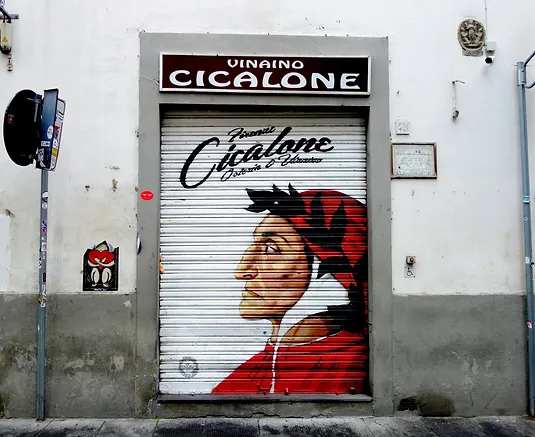
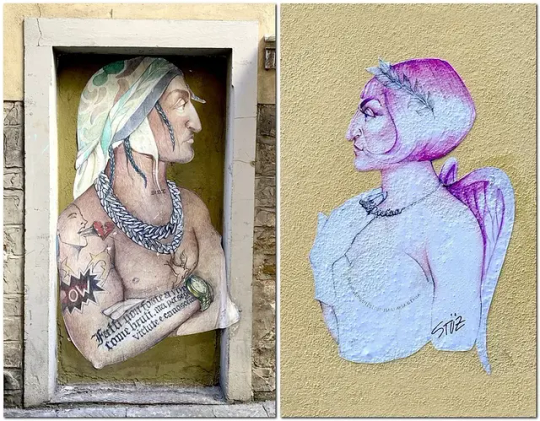
2 notes
·
View notes
Note
What do we know about the Ricords?
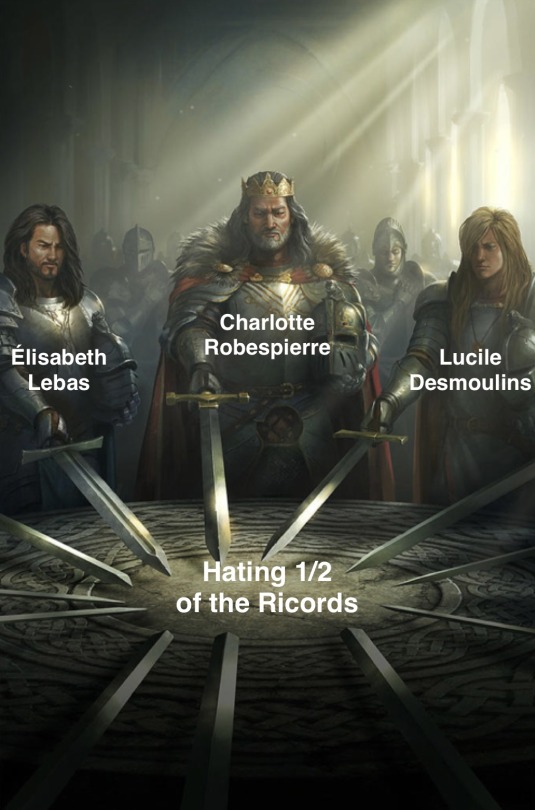
There actually exists a fairly recent biography on Ricord — La République à visage humain: Jean-François Ricord, maire de Grasse, conventionnel, représentant en mission (2019). If you want to learn about him properly I think the best might be to go consult that book, because I couldn’t really find more substantial info on him than his wikipedia article and some dictionary articles. As for Marguerite Ricord, according to the memoirs of René-Nicolas Dufriche, she was born in Grasse, with her maiden name being Rossignoly. Her father, born in the 1710s or 1720s, was an ex-Oratorian and doctor who had never had much work, ”a lazy and caustic Epicurean, [who] had made himself formidable by the most biting satires in verse. […] Quite an old satyr, because of the fire which still sometimes flashed from his eyes, and the convulsive movements of his lips which revealed two or three threatening teeth.” Marguerite had grown up with a mother — a ”remarkably gentle” woman it is said she ressembled — as well as two sisters, one of which was married by 1793, and a younger one named Thérèse or Théréson. More basic info — such as her year of birth, marriage and death — I’ve however not been able to find (and the only reason I even know her name was Marguerite is because different historians have all called her that).
As for Jean-François, he too had been born in Grasse, in 1759, where he, once the revolution rolled around, founded a local Jacobin Club. On January 6 and 9 1792, its parisian sister club lists someone named Ricord as intervening during their debates. This is ”our” Ricord according to the index, though I do have some doubts about it considering he at this point should still be in Grasse, where he had been elected mayor just two months earlier. Ricord and Marguerite most likely didn’t go to Paris until the fall of 1793, when the former was elected to the National Convention. There, he would go on to vote for the death of Louis XVI, rejecting both an appeal to the people and granting the king a reprieve. One day after Louis’ execution, January 22 1793, Lucile Desmoulins writes in her diary: ”Ricord came to see me. He is always the same, very brusque and coarse, truly mad, giddy, insane.” The next day she tells us about having met Ricord after witnessing the funeral procession of Le Peletier, and a week later about dining with Ricord, Sillery and three others.
The military doctor René-Nicolas Dufriche reported in his Souvernirs de la fin du XVIIIe siècle et du commencement du XIXe (1836) that, two months later, March 15 1792, the following scene took place:
I went to take a leave, on the evening of March 15, at my uncle V... and the rest of his family, by then gathered near him, and I thus embraced for the first and last time my adorable cousin Aimée, who died of grief shortly after the tragic end of our uncle. That day, I found at my aunt's house the wife of a deputy from Var who was attending the conferences held at V... This woman, apparently very shy, probably because she had no use of the world, learning that I was leaving the next day for Nice, told me that she was from Grasse and the daughter of a doctor, and that if I ever went to that city, she urged me to see her family, who would welcome me eagerly.
On July 21 1793 Ricord shows up for the very first time in the Récueil des actes du Comité de Salut Public (I’ve honestly not been able to find any trace of him between Lucile’s diary entry and this, neither in official debates nor anecdotes). On that day, he got tasked with going to the Army of Italy, replacing the representative Pierre Baille who had gotten the mission to go there alongside Augustin Robespierre two days earlier. According to Mary Young’s Augustin: the younger Robespierre (2011), Augustin and Ricord may already have been acquainted with one another, seeing as the latter, according to her, had a flat on 5 rue St Florentin, the same street Charlotte had gotten her brothers to go live on after her fallout with the Duplays.
Ricord decided to take his wife along with him on the journey. According to the memoirs of Charlotte Robespierre, it was when she learned of this fact that she asked her younger brother if she too may tag along, something which the latter agreed to ”with joy.” We don’t know when exactly the group set out, but the first letter from them to the CPS is dated August 16, when they for the moment are settled in Sault. Six days later we find them in Manosque. A week after that, August 28, Augustin writes to his brother from Aix reporting that ”I embraced all the prisoners, Ricord first of all” which might suggest Ricord had for a short time been captured by counter-revolutionaries. Finally, on September 8 they had reached Nice, where they would also go on to stay for more than a month (we have letters dated September 13, 16, 18, 23 and 24, and 5 October 5, 7, 8 and 16). Here, they ran into the military doctor René-Nicolas Dufriche once again who left the following anecdote in his Souvernirs de la fin du XVIIIe siècle et du commencement du XIXe (1836):
Walking one evening on the beautiful terrace which borders the sea, I came face to face with the representatives Barras and Fréron, who both flanked Madame Ricord, the wife of their colleague, who followed them a few steps away, chatting to Robespierre the younger. A swarm of young staff officers surrounded the national representation at a respectful distance. I was forced to greet the first group and approach madame Ricord, to ask her for news of her family, who had received me so cordially in Grasse. “Monsieur,” citoyenne Ricord said to me, “aren’t you a bit of a Girondin?” “No, madame, I’m simply a doctor.” Then, slowly retreating, I went to see the husband, who affectionately held out his hand to me and took a few steps away from Robespierre so that we could talk more at ease. “Citoyen representant,” I said to him, “your wife just asked me a very inappropriate question.” And I repeated what she had said. “Certainly, very inappropriate, and it does not surprise me, because my wife compromises me every day… Forget what she told you… I am counting on your silence.” "Admit, however, citoyen representant, that if Madame Ricord's question could cause me some grief, I could not help saying that your wife's suspicions infallibly relate to what she saw me do in Paris at my uncle V... She was waiting for you there, as you well know, chatting with my aunt and my cousin, while you deliberated in the neighboring salon... Isn’t that how it is?” "Certainly; I repeat to you that my wife does not have any common sense. Be calm, and whatever may happen, you will find in me a warm friend who will make use of your services.” While complying with the somewhat interested words of M. Ricord, a loyal man, I was not completely reassured. I had humiliated self-esteem and swallowed too much the ridiculous pretensions of a few Figaros, exclusive patriots and aesculapian servants of the proconsuls, so as not to apprehend the denigrations. Confining myself therefore into a clientele which increased every day, I avoided with extreme care the national representation and all its entourage.
According to Charlotte’s memoirs, it was also while in Nice that Marguerite caused her to fall out with Augustin:
Public spirit in Nice was no better than in all of Provence. But there we had nothing to fear from the counterrevolutionaries; there was a division of French troops. The general in chief, Dumerbion, and his general staff protected us, Madame Ricord and I, when her husband and my brother went out, which happened often. During my stay in Nice I went to the theatre only three times. The first time we were respected; the second time, the box that we had reserved had been taken over; the third time they threw apples at us, which did not reach us. General Dumerbion saw this and sent his aides-de-camp to pray us to come to his box. Then they no longer dared to throw anything at us, but after a few minutes, we left the theatre, and never set foot in it again.
Robespierre the Younger and Ricord had found that Army of Italy, which was soon to become illustrious by its great exploits, in a disastrous destitution. While they visited the different divisions and substituted everywhere order for disorder, abundance for famine, we kept occupied, Madame Ricord and I, in making shirts for the soldiers. In the evening, to relax, we walked in the country around Nice, sometimes on foot, sometimes on horseback. Our equestrian outings made people talk, and fed the viciousness of our enemies. It was written in Paris that we acted like princesses; several journals paid by the aristocracy propagated this absurd accusation, and Maximilien Robespierre wrote me to let me know. My younger brother spoke to me about it too, and I promised him to refuse myself the pleasure of riding from then on.
Madame Ricord, who was the most frivolous and inconsiderate person in the world, made the same promise but with the resolution not to keep it. Here I must give an idea of her character. For long I had believed her to be only coquettish and flighty; but I saw at last, through my own experience, that she was malicious and sought every means to make my younger brother quarrel with me and send me back to Paris. My presence was unbearable to her; a passionate lover of pleasure, and often of pleasures not permitted to respectable women, she found me a strict and rigorous witness who was getting in her way. Indeed, a lady who interested herself in me, and who saw in Madame Ricord’s household that I was displaced in her society, and in that of a lady she spent her time with who was no better than her, told me once: You are too virtuous to remain her; your presence alone criticizes them. I did not at first understand the meaning of those words; later, and when I had been the victim of the blackest treason, I recalled them, and I admired the simplicity with which I had been unable to understand them.
To return to the rides on horseback, which had been formally forbidden me by my two brothers: one day when Robespierre the Younger and Ricord were out, Madame Ricord proposed that we go on one such ride, and here is the occasion: we had been invited, she and I, to dine with some persons of her acquaintance. After dinner, and when the horses were ready as well as a coach for those who did not know how to ride, Madame Ricord said: Let’s go; the coach and the horses are ready; absolutely as if it had been agreed in advance that the ride would take place. I approached her and reminded her in a whisper of my brother’s prohibition; she did not listen to me and left me, laughing. I did not dare to explain myself more fully before the rest of those present; I resigned myself and got into the coach.
For the whole length of the ride I was upset and had a heavy heart, so much was a affected to be disobeying my brother. Assuredly I took no part in the others’ pleasure, and I would have preferred a thousand times to not have left the house. One idea consoled me. If my brother, I said to myself, learns of this ride, as it is inevitable that he will, at least he will know that I was not the one who wanted it; he will know that I protested to Madame Ricord, and that she did not want to take account of them; he will know at last that she was the one who wanted this ride and that I could do nothing other than follow her; Madame Ricord will have to assume the responsibility.
Two days later my brother returned. The day of his arrival he did not speak to me of the ride we had taken, and I believed that, knowing that I had been forced, so to speak, he did not hold it against me. But the next day I was quite surprised to hear him reproach me. I wanted to explain myself; he replied that I was the one who had wanted us to take that ride; so I called Madame Ricord to witness. What became of me and what was my surprise and my indignation when that woman, instead of declaring the truth, reinforced with an imperturbable effrontery that it was I, effectively, who had wanted the ride and had taken her along against her will? I was floored; I lacked the words to respond; those who were present could believe that I was guilty to see the assurance of Madame Ricord and my stupefaction. But should my brother have believed this odious lie? He knew me: he knew I was incapable of lying. Why then did he not want to believe me? When I was alone I wept much. That scene had made the most painful impression upon my heart. But I resolved to hide my distress, not to show it to anyone, especially not my brother. He no longer spoke to me of it, and it would have been possible to believe that nothing had happened, if he had not kept a certain coldness in regard to me that caused me to despair. There is the result of Madame Ricord’s lie. As for her, she had neither more cares nor less gaiety because of it; she still had her laughing and frolicking humor: one might truly have dad, to see her air of satisfaction, that she was happy with herself, and that she had done the world’s greatest act.
It will rightly be supposed that after having been so cruelly played by Madame Ricord, I could no longer have for her either esteem or respect; that is, at least, if I had had any for her before the scene I have just described. In effect, how should one esteem a woman who knows so little of the rules of propriety and her duties as a wife to commit the gravest offenses against them? How should I have loved a person who continually compromised my younger brother with her advances, to which he believed it essential to his honor and duty not to respond? In truth, if modesty did not hold back my pen, I would say some things which would not be to Madame Ricord’s advantage. She was young and charming; but her coquetry was at least equivalent to her beauty. She wanted to shine and be adored at any price, and would do anything to get attention.
Ricord loved his wife, and had unlimited confidence in her. Absorbed as he was by numerous occupations, he did not see her offenses, and could never have suspected them. Ricord had every public and private virtue; he could be equaled but not surpassed in patriotism; he was one of the most ardent and intrepid Montagnards. A faithful and trustworthy friend, a tender husband, he deserved a different wife, and never was a couple, in my opinion, less well matched. Probably he had always been unaware of his wife’s actions regarding me; she would set him against me, and, since he saw only by her eyes in these matters, he believed everything she said.
My departure from Nice was approaching, though I did not suspect it. I did not know then, and I have only learned since, that Madame Ricord unceasingly abused me to my brother, inventing a thousand lies in order to make him lose his friendship for me. My brother’s coldness redoubled with each passing day and I knew not what to attribute it to. Doubtless I should have asked Augustin for an explanation concerning this change; but I saw him so busy, so overwhelmed with work, that I could not resolve myself to do so. We were both victims of the cruelest of hoaxes.
Madame Ricord, who perhaps hoped that my brother would be less insensible to her advances in my absence, plotted my removal. She set a trap for me, and right away I fell into it, so little was the ability to resist that woman in my character. My brother having left Nice on a six-day trip, Madame Ricord proposed that we should spend that time in Grasse, with one of her friends. I accepted, without suspecting anything, and we left. We had hardly arrived in Grasse when a letter was brought to Madame Ricord which had been, it was said, addressed to Nice. Madame Ricord told me that this letter was from my brother and that he prayed me to return as promptly as possible to Paris.
Judge of my shock! My brother, without coming to see me, without bidding me farewell, was sending me away like a reprobate. Nothing could have been more incredible, and yet I let myself fall into this crude trap. Listening for the moment only to my indignation, I reserved a place in a private coach departing for Paris, and I left the next morning.
I have since much reflected, sadly, on this precipitated departure. I should have had the letter where my brother supposedly ordered me to leave shown to me; I should have returned to Nice, waited for him, and asked him whether it was true that he was banishing me, so to speak, from his presence. I would have gotten proof of the contrary from him directly; my eyes would have been opened upon the abyss that had been dug before me, and his eyes would have been opened about a woman whom he had believed until then—all her calumnies and all her lies.
But, to my unhappiness, it was not so. I credulously believed what Madame Ricord told me, and still I do not dare think of all the conjectures that Robespierre could have drawn from my brusque departure. She would have told him that I wanted to leave without seeing him, because I did not care for him; what would she not have told him! She would have embittered him against me in every way. It was easy for me, upon his return to Paris, to judge the effect that the venomous words of the Madame Ricord had had on him. He no longer wanted to see me, and the events of the Thermidor took place before I could explain myself to him. Thus, to the grief of having lost my two brothers is added that of having had this misunderstanding with one of them, who took the idea that I had wronged him to the grave. Is it possible for one to be unhappier than I? Madame Ricord congratulated herself for what she did; she could not have known that she was preparing me an entire life filled with tears and regrets!
(I myself have already speculated on whether this really is the (full) story behind Augustin and Charlotte’s fallout in this post).
On October 17, Augustin writes from Nice that Ricord has gone to Lyon and only he remains in the city (Mary Young speculates that Margueite might have stayed in Nice too and it was now, with her husband out of the way, that the love affair between her and Augustin really blossomed out). One day later, Fréron writes from Marseilles, where Ricord’s made a stop, to Desmoulins and tells him that ”Ricord is going to tell you about so many things. […] [he] will give you my adress,” The same day Fréron also wrote to Lucile Desmoulins exclaiming: ”How lucky Ricord is! So he is going to see you again, Lucile, and I, for a century, have been in exile.” […] He is leaving, this fortunate mortal, and I venture to give him this letter for you, the content of which he is unaware about.” Fréron you f:ing creepo. This instead suggests Ricord had been given a leave and was on the road to Paris. Eleven days after Fréron’s letters were penned down, October 29, Ricord presented himself at the parisian Jacobin club where he, after having denounced a spy hiding in said club and provoked a decree to arrest the man in question, complains about the dragged out trial against the Girondins, saying that Brissot should only need to answer the following two questions: Are you Brissot? and Are you the deputy of the National Convention? If the answer is yes, Ricord argues, he shall be shot, citing as examples similar judgments he has seen in Marseille, ”which have done the greatest good.” His suggestion was however not received by any hearing, with the deputy Renaudin rising to state that these measures may be suitable in Marseilles, but that in Paris, it must still be the law that condemns, and Ricord being met by murmurs when wanting to justify his opinion. He had to content himself with giving news regarding the south, praising Barras, Fréron and the Committee of Public Safety and encouraging the idea of purging Paris of aristocrats, and this time he was met by a warmer response.
Ricord presented himself at the Jacobin club again on November 23 (this is the last time he’s recorded as speaking there) where he again praised Fréron and Barras and asked that Marseille be left to them. Six days later we find him at Toulon together with Augustin, Barras, Fréron and Saliceti. On December 11 they get the order to march on the city from the Committee of Public Safety, and nine days later, they could report that they had entered it.
In his memoirs, Barras writes the following regarding the Ricords in Toulon:
Bonaparte, after the siege of Toulon, was appointed brigadier-general, with orders to join the Army of Italy, under the orders of General Dumerbion; it was then, through the patronage of Aréna, that he became intimate with Robespierre the younger and Ricord and his wife, afterwards his protectors. From the time Bonaparte joined the first Army of Italy, holding very low rank, he desired and systematically sought to get to the top of the ladder by all possible means; fully convinced that women constituted a powerful aid, he assiduously paid court to the wife of Ricord, knowing that she exercised great influence over Robespierre the Younger, her husband's colleague. He pursued Mme Ricord with all kinds of attentions, picking up her gloves, handing her her fan, holding with profound respect her bridle and stirrup when she mounted her horse, accompanying her in her walks hat in hand, and seeming to tremble continually lest some accident should befall her.
Augustin, who had taken a bullet to the knee during the taking of the city, left for Paris just two days afterwards. According to Charlotte’s memoirs, her brother went to lodge with ”his collegue Record” (she probably means Ricord) during his stay in the capital, no longer wanting to see her after their fallout. Barras’ memoirs similarily contains an anecdote about Augustin and Ricord meeting up with a boy whose mother (who Augustin had known) has been guillotined, and giving him clothes and food while on a stay in Paris together. But this sounds unlikely to be true, considering Augustin and Ricord never went on leaves to Paris at the same time.
Ricord stayed in Toulon throughout the rest of 1793 (we have letters confirming this dated December 23 and 28 and January 5). On December 29 he got tasked with going back to Nice by the CPS, where we find him on January 20. Six days later, the CPS wrote to inform him that he had been the subject of several denounciations:
…Have you studied the men around you enough? Right now, it’s the aristocrats that make up your société habituelle in Marseille. You have moved in with one of these suspicious men, named Saint-Mesme. The patriots making up the Supervisory Committee were molested by you. […] The Committee has also been informed that you plan to decide alone who are those who, placed under arrest by the representatives of the People and the Supervisory Committees, must be detained. And here the Committee reminds you that you are powerless in Marseille. Your mission is limited to the army of Italy and the department of Var; everywhere else your authority ceases, it is null. Finally, you claimed that the law against emigrants was too rigorous, that the Convention would be obliged to revoke it. Isn't this frightening, isn't it putting off auctions? Does this not call for alarm and distrust in the pledge of national wealth? The Committee of Public Safety, fellow citizen, would have liked to spare itself the painful duty of pointing out such errors, so as not to indulge in the memory of the good you have done. It likes to think that this is only a momentary aberration of yours. […]
Ricord nevertheless remained away on missions up until the fall of Robespierre (I’ve however not found any anecdotes/interesting information regarding him during the rest of the period). We know Marguerite was still together with him up until at least April 5, when Augustin wrote to his brother: ”Ricord and his wife embrace you.” But two days after the brothers’ execution, July 30, a CPS decree signed by Collot d’Herbois ordered Ricord to immidiately return to the Convention. Ricord understood he was under suspicion for his ties to Augustin, and on August 5 he authored the following letter (cited in Young’s Augustin: the younger Robespierre , page 174) from Nice:
Monsters that the Republic still has in its bosom have plotted new assassinations. An unbelievable conspiracy has found place in the hearts of traitors… But their authors have received the just punishment that they merited. It is that you should be aware of this that I publish the proclamation of the National Convention to the people of France... This event will only augment your zeal and make you more vigilant in seeking out the guilty. The Constitution needs all your zeal in unmasking and pursuing the enemies of liberty and equality.
And one day later, still in Nice, he also wrote this letter to the CPS, confirming he had received theirs:
Upon reading, citizens and collegues, your letter and the proclamation of the National Convention, I regretted not being at the Convention to vote for the death of the infamous scoundrels who had the criminal audacity to conspire against freedom. The perfidious! as they had deceived the people! I blush to have been the friend of Robespierre the younger. It is true that I thought him honest; but from the moment of his treason he had no more implacable enemy than me. You will learn without surprise that all hearts are entirely for liberty, the National Convention and the government. The army, the popular societies, the administration, all have sworn once again the annihilation of all kinds of tyranny. In accordance with your decree of the 12th, I am leaving in two hours to travel to the heart of the National Convention. Salut et fraternité, Ricord.
On August 6 we find a letter to the CPS sharing suspicions regarding Ricord. According to wikipedia, Ricord was also accused by Cambon on August 24, though I’ve not found the minutes for the session which he does so… Regardless, Ricord was lucky and these denounciations never went anywhere.
In her memoirs, Élisabeth Lebas claims that Ricord and several other men unsuccessfully tried to seduce her sister-in-law Henriette shortly after thermidor:
Our position was so dreadful that my sister-in-law had to return to her family. It sufficed that, young and pretty, and having lost her mentor, she could not solicit my liberty; those curs, like Ricord and others, pursued her, seeking every means of seducing her, even promising her my liberty. Though she was young, she saw well that those monsters were seeking ways to corrupt her and dishonor her family. She preferred to leave, guessing rightly that they would do nothing either for me or for my brother-in-law François Le Bas, adjutant-major.
After this, it’s not until the following year I’ve found any info on Ricord. But in the aftermath of the Insurrection of 1 prairial (May 20 1795) we find a decree ordering the arrest of ”Charbonnier, Escudier, Salicetti and Ricord, for having fomented movements in Marseille and Toulon whose history belongs to the era which followed the days of Prairial.” We have a defence written by Ricord dated July 30 the same year, as well as another from October 14, but he nevertheless remained in prison until November 1795, when he benefited from an amnesty issued at the closing of the National Convention. But just a few months later he came under suspicion again for participation in the conspiracy of equals. I’ve however not been able to find much info on his role in this affair besides the fact that he again got off the hook.
Finally, in 1816 Ricord was exiled to Belgium as a regicide where he died on 21 February 1818, at the age of 58. I don’t know what became of Marguerite. As of now, I’m also unaware whether or not they had any children.
#Marguerite said something political which the men in her life didn’t approve of instead accusing her of compromising them?#I can’t for my LIFE put my finger on who THAT reminds me of#srs charlotte this wasn’t even supposed to be about you and it’s made your story even more messy#ricord#ask#augustin robespierre#charlotte robespierre
12 notes
·
View notes
Text
Stockholm Week 16: Tate McRae in Stockholm!
It was my second to last week in Stockholm. I can’t believe that it’s time for me to go back to the US already. It feels like I’ve been here for two months now… I still have so much more to try and enjoy ;-;
The weather is beautiful now: it ranges from the high 40s to the low 70s but the sun makes it feel like mid 70s!
4/30 Tue: Cherry Blossoms in Kungsträdgården
On Tuesday, I had a group presentation for Crime Fiction. We presented a rewrite of the book that we read, The Legacy, for 20 minutes.
After class, I went to ICA nearby and bought ice cream as a small treat for myself :))
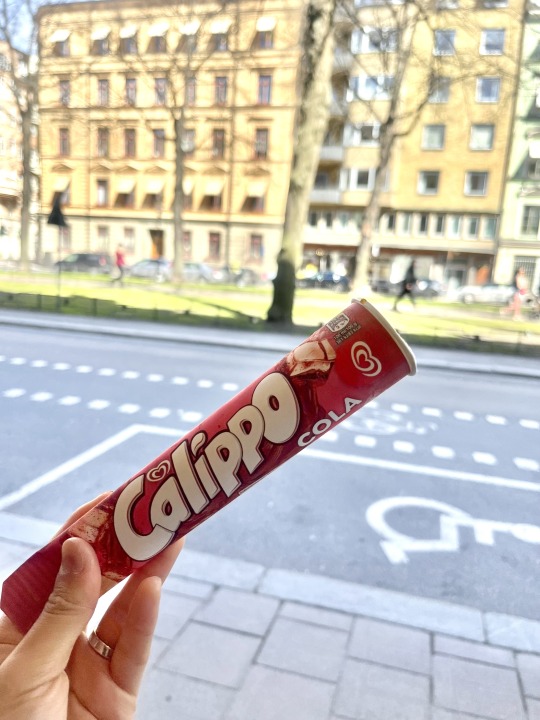
Coca-cola popsicle❤️
Ranting about the cherry blossoms for a few days did bore fruit: we went to see the cherry blossoms in Kungsträdgården.
Walking on a street full of cherry blossoms was on my bucket list for the longest time – being able to check it off the list in Stockholm was a wonderful experience. They were fully bloomed and the streets were fully packed too.
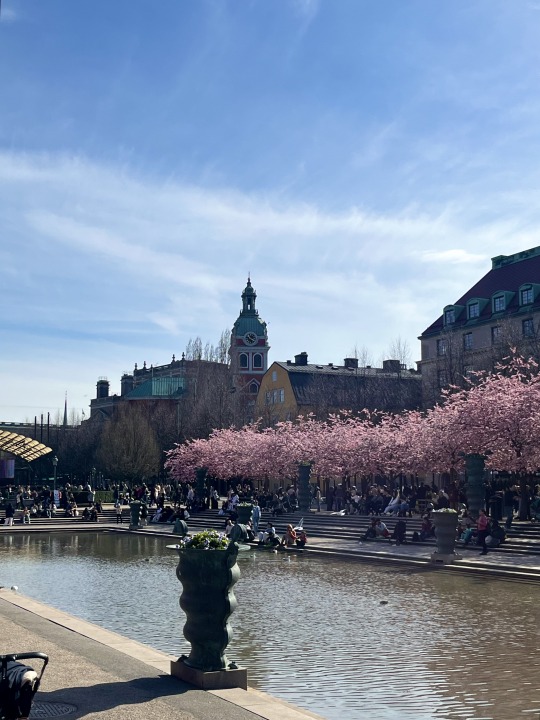
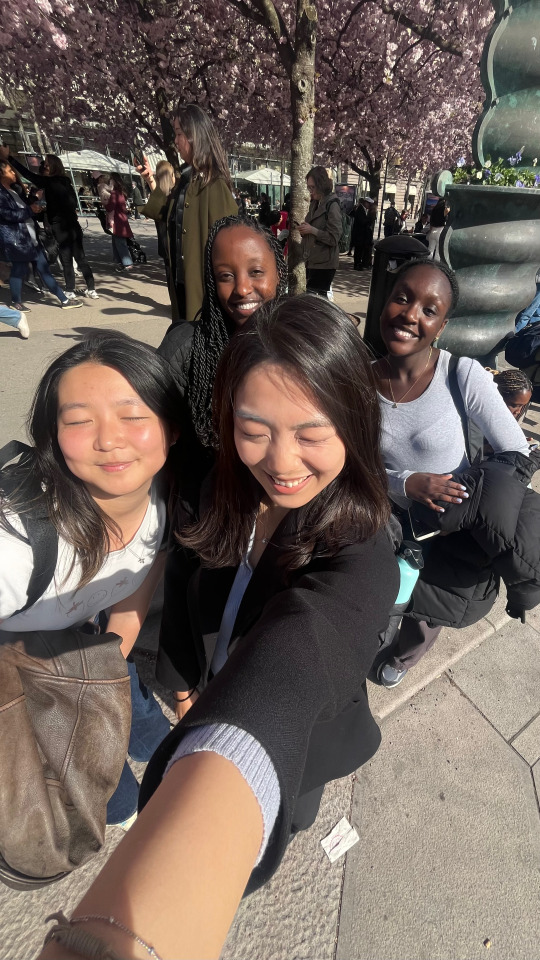


I could see happiness
On top of the cherry blossoms, I got to go out on a nice dinner for my friend’s birthday. We went to Florentine, a popular Italian restaurant in Stockholm.
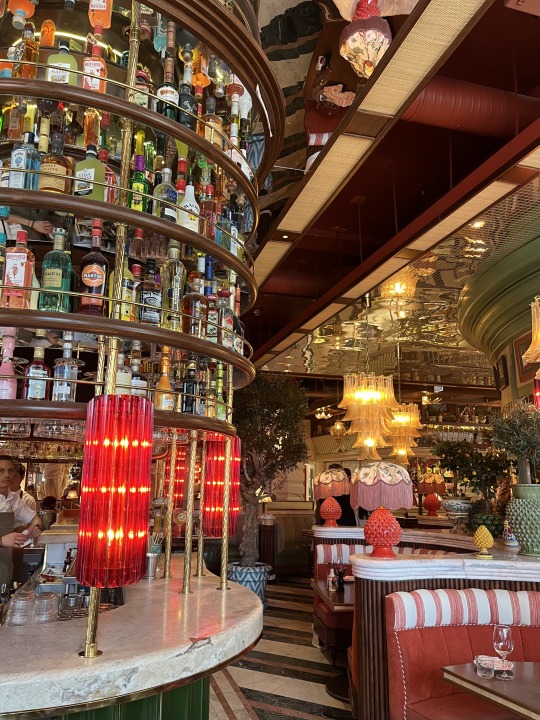


Their signature drink Florentine on the Beach was fire🔥
The walk back to my house was a new experience due to the sight of hundreds of people wearing the same white marine hat. Apparently, it is a high school graduation tradition where all the graduating seniors where the hat and celebrate after school. Even the way back home was interesting!
I also spotted wildflowers on the streets on the way back home (I swear they weren’t there before).

Small things make me smile :)
Tuesday was a day packed with joy!
5/1 Wed: Food Trial
My friends and I checked out this Korean fried chicken place! We made a reservation for 5 people but had to wait an hour until the food came out… The taste wasn’t what I expected either🥲 Wouldn’t necessarily recommend but they did try their chicken well!

Monster chicken
5/2 Thu: TATE MCRAE
The big day has come – I completely forgot about the Tate McRae concert until a couple of days ago and I got extremely excited since then.ᐟ.ᐟ.ᐟ
But before the concert: I woke up early (10 am) to do my laundry and saw this beautiful scenery outside the window.
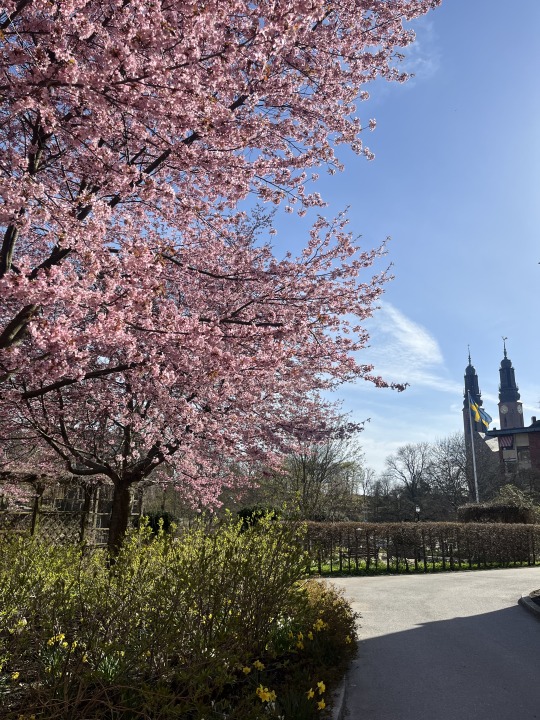
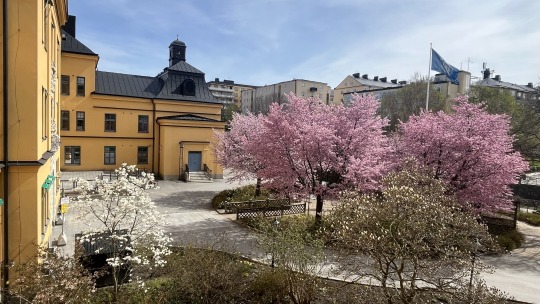
Our garden is the best no cap < 3
I dressed up both for my final poster presentation for the Engineering Sustainable Environments in Scandinavia core course AND the concert because I had no time to change.

I was originally planning to miss the last class dinner, but (1) the class ended early and (2) I was convinced by free food. The burger place we went to was the building right next to DIS, so it didn’t consume much time either.
The burger with sweet potato fries (it was gas) on top of Briska pear cider (I love that thing) was the best combination I could think of.
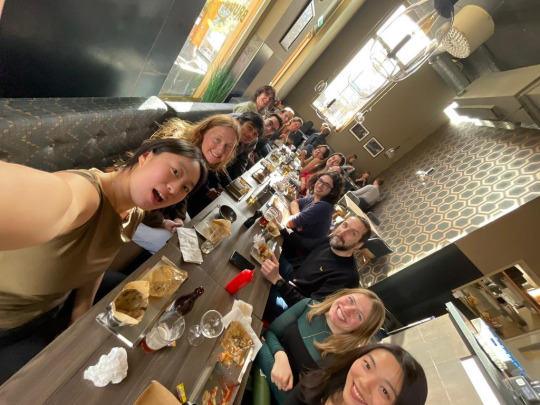
Group pic!
I sprinted out of the restaurant not too late after my friends (already at the concert) asked me where I was.
I made it in time to Avicii Arena: I stood in the line for a good amount of time and went through security relatively quickly.

Once I went inside, I moved upstairs and my friends followed my lead. We had a better view!

The concert started with Charlieonafriday, who performed for about thirty minutes. He was a very good singer and a rapper! Low key a fan now.
The intermission after the opening was 45 minutes, and we were doubting if Tate McRae was lost or something. Thankfully, she came out and we enjoyed a full hour of her performance.


My personal favorites were greedy, exes, and you broke me first. And wow she could dance for real.
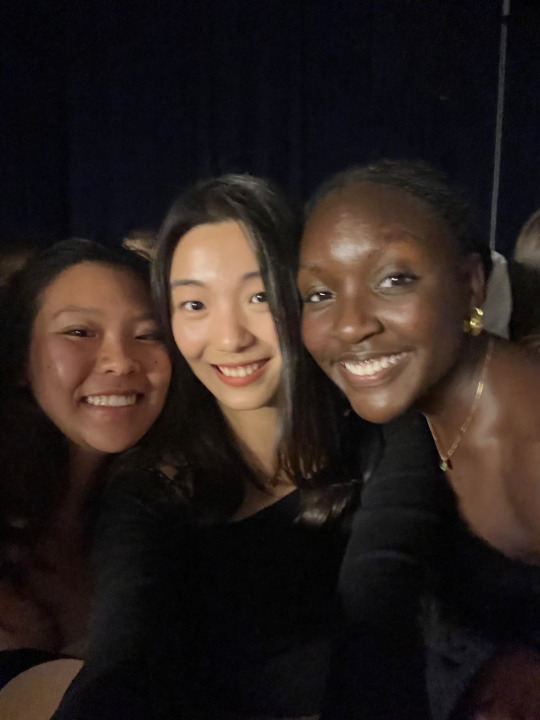
I did not want it to end :((
5/3 Fri
On Friday, I perfected my oral exam script for Swedish. My partner and I pulled together and memorized a 5-minute speech in Swedish with good pronunciation :)
We were constantly getting 5 minutes and 30 seconds on practices, but when we actually did the exam it somehow got shortened to 5 minutes.
Nevertheless, it was a success!
After our exam, we could leave early, so I went thrifting as a treat for myself. I was on a mission to find a brown leather jacket, but it did not happen :( I do not think it’s happening anytime soon either…

I almost bought the rabbit version but I stopped myself
I took a little detour to a park next to our apartment. Cherry blossoms and wildflowers prompted everyone (AND PUPPIES) to come out!

Spring is making me an outdoorsy person :)
The views from the garden in front of our apartment! I relaxed and absorbed the sunlight for a bit.

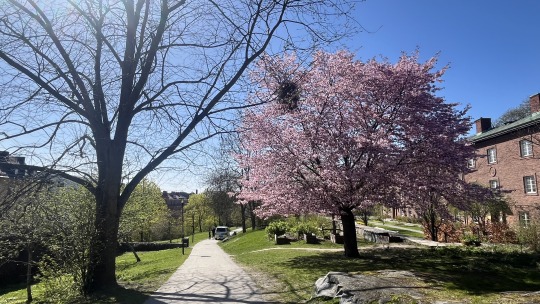
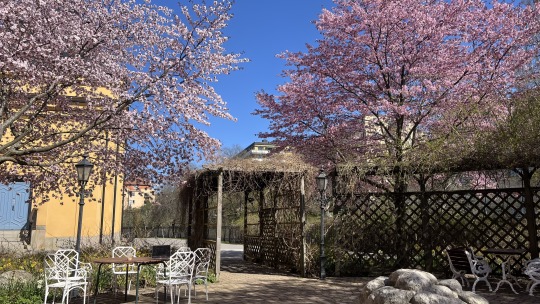

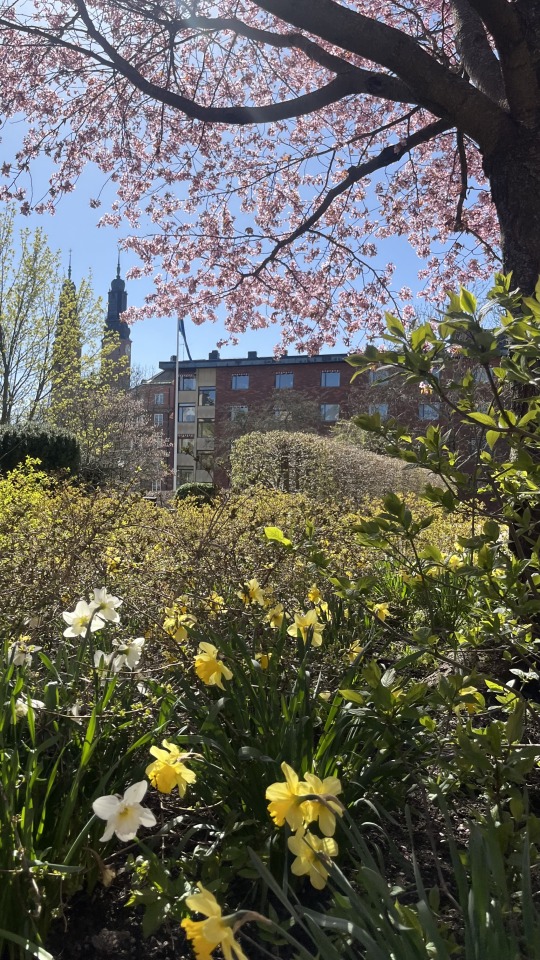
The next post will be devoted to my time in Italy.
I’ll see you later!
Hey då,
Jiwoo Kim
Chemical Engineering
DIS Study Abroad in Stockholm, Sweden
2 notes
·
View notes
Text
Round 1, Match 29
Sister Maria-Fiore dei Fiori di Montagna (The 44 Scotland Street Series) vs Esther Blanchett (Trinity Blood)


Sister Maria-Fiore is a member of the Little Sisters of the Bourgeoisie
Sister Maria-Fiore dei Fiori di Montagna
Italian socialite nun from a religious order dedicated to tending to people afflicted with "Stendhal Syndrome" (falling ill due to being overcome by the beauty of Florentine art at the Ufizzi Museum). They brew their own gin, grow lemons and make tonic water, which they combine to make their cure for Stendhal Syndrome. She is also in a thinly veiled lesbian relationship with her "friend" Antonia, who she met when Antonia came down with Stendhal Syndrome.
Esther Blanchett
she's so cute
#best nun tournament#poll#poll tournament#round 1#Sister Maria-Fiore#Esther Blanchett#Trinity Blood#44 Scotland Street#Love in the Time of Bertie
3 notes
·
View notes